Here are my favorite poems about disappointment categorized:
- Short poems about disappointment
- Poems about disappointment in love
- Poems about disappointment in life
So if you want the best poems about disappointment, then you’re in the right place.
Keep reading!
- 53 Pensive Poems About Melancholy
- 73 Wistful Poems About Longing
- 105 Dark Lonely Poems
- 49 Stinging Poems About Missing Someone

Crushing Poems About Disappointment

Let’s turn the spotlight on the most relatable yet often underrated emotion – disappointment, in this collection we’ve meticulously categorized for you.
Navigate the rollercoaster of dashed hopes and unmet expectations with poems where each line is like a punch to the gut or a bittersweet sigh the captures the raw essence of disappointment.
These verses delve deeper into the profound disappointments we encounter on our journey, exploring themes of shattered dreams, missed opportunities, and the scars left behind.
Get to know more about this emotion through the poems penned by renowned authors and feel the sting of disappointment in each line.
Let’s get started!
My #1 Favorite Poem About Disappointment

“Disappointment” by Laurence Hope
Oh, come, Beloved, before my beauty fades,
Pity the sorrow of my loneliness.
I am a Rosebush that the Cypress shades,
No sunbeams find or lighten my distress.
Daily I watch the waning of my bloom.
Ah, piteous fading of a thing so fair!
While Fate, remorseless, weaving at her loom,
Twines furtive silver in my twisted hair.
This noon I watched a tremulous fading rose
Rise on the wind to court a butterfly.
“One speck of pollen, ere my petals close,
Bring me one touch of love before I die!”
But the gay butterfly, who had the power
To grant, refused, flew far across the dell,
And, as he fertilised a younger flower,
The petals of the rose, defrauded, fell.
Such was my fate, thou hast not come to me,
Thine eyes are absent, and thy voice is mute,
Though I am slim, as this Papaya tree,
With breasts out-pointing, even as its fruit.
Beauty was mine, it brought me no caress,
My lips were red, yet there were none to taste,
I saw my youth consume in loneliness,
And all the fervour of my heart run waste.
While I still hoped that Thou would’st come to me,
I and the garden waited for their Lord.
Here He will rest, beneath this Champa tree;
Hence, all ye spike-set grasses from the sward!
In this cool rillet I shall bathe His feet,
Come, rounded pebbles from a smoother shore.
This is the honey that His lips will eat,
Hasten, O bees, enhance the amber store!
Ripen, ye Custard Apples, round and fair,
Practise your songs, O Bulbuls, on the bough,
Surely some sweeter sweetness haunts the air;
Maybe His feet draw near us, even now!
Disperse, ye fireflies, clustered on the palm,
Love heeds no lamp, he welcomes moonless skies:
Soon shall ye find, O stars, serene and calm,
Your sparkling rivals in my lover’s eyes!
Closely I wove my leafy Jasmin bowers,
Hoping to hide my pleasure and my shame,
Where the Lantana’s indecisive flowers
Vary from palest rose to orange flame.
Ay, there were lovely hours, ‘neath fern and palm,
Almost my aching longing I forgot.
White nights of silence, noons of golden calm,
All past, all wasted, since Thou camest not!
Night after night the Champa trees distilled
Their cruel sweetness on the careless air.
Noon after noon I watched the Bulbuls build,
And saw with hungry eyes the Sun-birds pair.
None came, and none will come; no use to wait,–
Youth’s fragrance dies, its tender light dies down.
I will arise, before it grows too late,
And seek the noisy brilliance of the town.
These many waiting years I longed for gold,
Now must I needs console me with alloy.
Before this beauty fades, this pulse grows cold,
I may not love, I will at least enjoy!
Farewell, my Solitude of scented flowers,
Across whose glades the emerald parrots gleam,
Haunt of false hope, and home of wasted hours,
I am awake, at last,–Guard thou the dream!
Short Poems About Disappointment

“Happiness Betrays Me” by Helen Hoyt
Happiness betrays me—
Happiness slays me!
Sorrow was kind and loneliness was my sweet companion,
Denial gave me good gifts.
Now freedom is a bondage upon me
And smoothness slackens my feet.
I will find my way back to the thorns;
I will find my way back again to the good thorns and steepness.
Happiness betrays me—
Happiness slays me.
“Our Sorrow” by Alva N. Turner
Your sorrow died,
And you buried it;
And then you dried
Your tears
As you went your way
Forgetting it:
While mine lives through the years.
Men understood your sorrow
Because it died,
And pitied your tears,
Which you have dried;
But they leer at my sorrow
And sneer,
Because it lives through the years.
“The Last Leaf” by Alexander Pushkin
I ’ve overlived aspirings,
My fancies I disdain;
The fruit of hollow-heartedness,
Sufferings alone remain.
’Neath cruel storms of Fate
With my crown of bay,
A sad and lonely life I lead,
Waiting my latest day.
Thus, struck by latter cold
While howls the wintry wind,
Trembles upon the naked bough
The last leaf left behind.

“Ashes of Roses” by Elaine Goodale Eastman
Soft on the sunset sky
Bright daylight closes,
Leaving, when light doth die,
Pale hues that mingling lie,—
Ashes of roses.
When love’s warm sun is set,
Love’s brightness closes;
Eyes with hot tears are wet,
In hearts there linger yet
Ashes of roses.
“A Saddened Tramp” by Anonymous
“Now unto yonder wood-pile go,
Where toil till I return;
And feel how proud a thing it is
A livelihood to earn.”
A saddened look came o’er the tramp;
He seemed like one bereft.
He stowed away the victuals cold,
He—saw the wood, and left.
“Of disappointed Purpose” by Negligence by Sir Thomas Wyatt
Of Carthage he that worthy warrior
Could overcome, but could not use his chance;
And I likewise of all my long endeavour
The sharp conquest though fortune did advance,
Ne could I use. The hold that is given over
I unpossess, so hangeth now in balance
Of war my peace, reward of all my pain,
At Mountzon thus I restless rest in Spain.
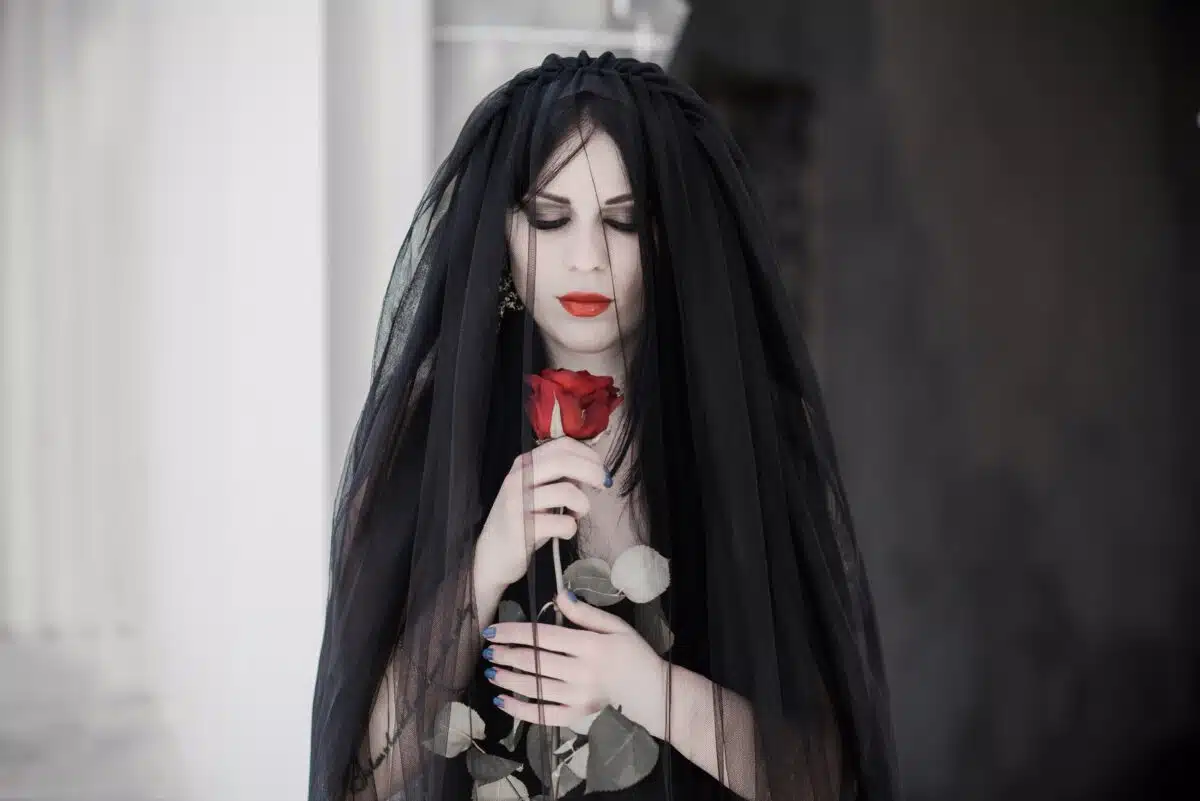
“The Shadow Rose” by Robert Cameron Rogers
A noisette on my garden path
An ever-swaying shadow throws;
But if I pluck it strolling by,
I pluck the shadow with the rose.
Just near enough my heart you stood
To shadow it,—but was it fair
In him, who plucked and bore you off,
To leave your shadow lingering there?
“The Luzumiyat of Abu’l-Ala, XXXVI” by Al-Ma‘arri (Ameen Rihani, Translator)
And round the Well how oft my Soul doth grope
Athirst; but lo! my Bucket hath no Rope:
I cry for water, and the deep, dark Well
Echoes my wailing cry, but not my hope.
“When you told us our glances, soft, timid, and mild” by Wallada bint al-Mustakfi (Joseph Dacre Carlyle,Translator)
When you told us our glances, soft, timid, and mild,
Could occasion such wounds in the heart,
Can ye wonder that yours, so ungovern’d and wild,
Some wounds to our cheeks should impart?
The wounds on our cheeks, are but transient, I own,
With a blush they appear and decay;
But those on the heart, fickle youths, ye have shewn
To be even more transient than they.

“Regret” by Richard Le Gallienne
One asked of regret,
And I made reply:
To have held the bird,
And let it fly;
To have seen the star
For a moment nigh,
And lost it
Through a slothful eye;
To have plucked the flower
And cast it by;
To have one only hope—
To die.
“The Small Hours” by Dorothy Parker
No more my little song comes back;
And now of nights I lay
My head on down, to watch the black
And wait the unfailing gray.
Oh, sad are winter nights, and slow;
And sad’s a song that’s dumb
And sad it is to lie and know
Another dawn will come.
“Sorrow” by Edna St. Vincent Millay
Sorrow like a ceaseless rain
Beats upon my heart.
People twist and scream in pain,—
Dawn will find them still again;
This has neither wax nor wane,
Neither stop nor start.
People dress and go to town;
I sit in my chair.
All my thoughts are slow and brown:
Standing up or sitting down
Little matters, or what gown
Or what shoes I wear.

“For a Sad Lady” by Dorothy Parker
And let her loves, when she is dead,
Write this above her bones:
“No more she lives to give us bread
Who asked her only stones.”
“Disillusion” by Madison Julius Cawein
Those unrequited in their love who die
Have never drained life’s chief illusion dry.
“Sorrow. A Quatrain” by Madison Julius Cawein
Death takes her hand and leads her through the waste
Of her own soul, wherein she hears the voice
Of lost Love’s tears, and, famishing, can but taste
The dead-sea fruit of Life’s remembered joys.
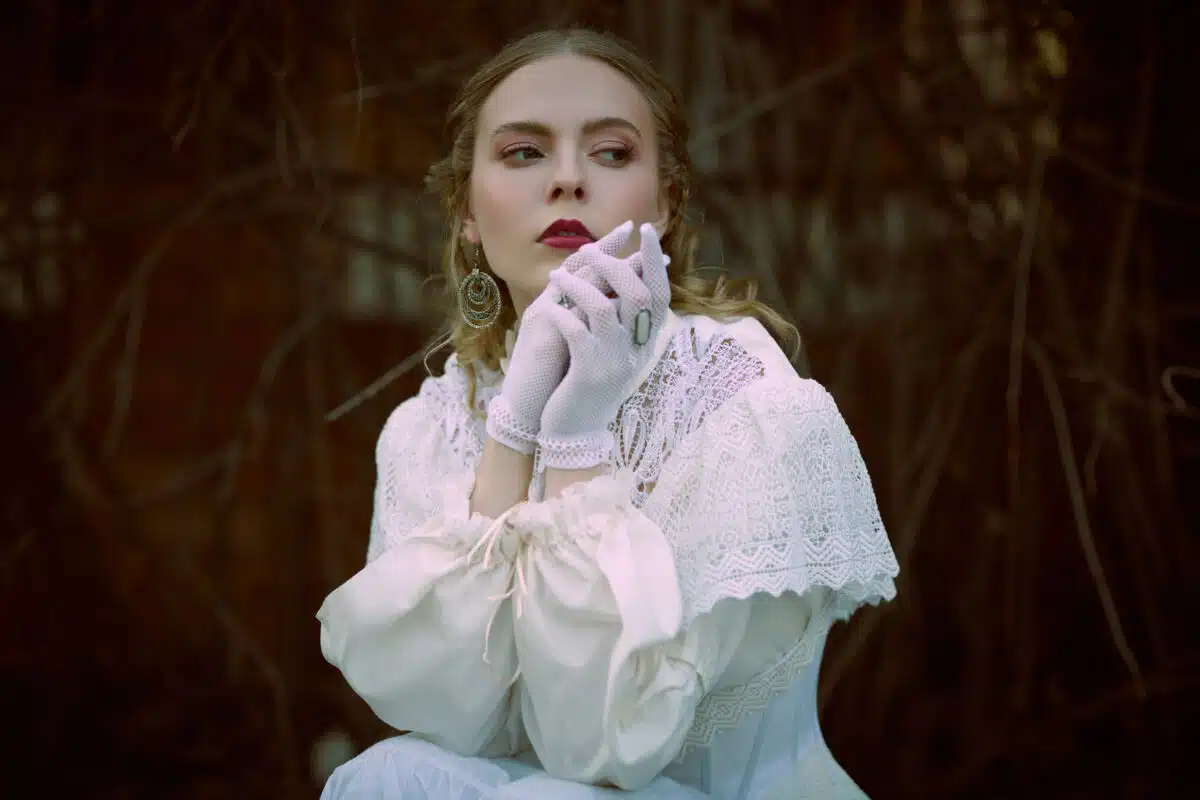
“Disillusion” by Paul Bewsher
You mortals see the sky –
I only see the ground,
As through the air I fly.
You mortals see the sky,
And yet with envy sigh
Because to earth you’re bound!
You mortals see the sky –
I only see the ground!
“Despondency” by Matthew Arnold
The thoughts that rain their steady glow
Like stars on life’s cold sea,
Which others know, or say they know—
They never shone for me.
Thoughts light, like gleams, my spirit’s sky,
But they will not remain.
They light me once, they hurry by;
And never come again.
“Fragment: Love The Universe To-Day” by Percy Bysshe Shelley
And who feels discord now or sorrow?
Love is the universe to-day—
These are the slaves of dim to-morrow,
Darkening Life’s labyrinthine way.

“Disenchantment” by Emily Elizabeth Dickinson
It dropped so low in my regard
I heard it hit the ground,
And go to pieces on the stones
At bottom of my mind;
Yet blamed the fate that fractured, less
Than I reviled myself
For entertaining plated wares
Upon my silver shelf.
“To-Morrow” by Percy Bysshe Shelley
Where art thou, beloved To-morrow?
When young and old, and strong and weak,
Rich and poor, through joy and sorrow,
Thy sweet smiles we ever seek,—
In thy place—ah! well-a-day! _
We find the thing we fled—To-day.
“Song From The Wandering Jew” by Percy Bysshe Shelley
See yon opening flower
Spreads its fragrance to the blast;
It fades within an hour,
Its decay is pale—is fast.
Paler is yon maiden;
Faster is her heart’s decay;
Deep with sorrow laden,
She sinks in death away.

“Regret And Remorse” by Ella Wheeler Wilcox
Regret with streaming eyes doth seem alway
A maiden widowed on her wedding day.
While dark Remorse, with eyes too sad for tears,
A crushed, desponding Magdalene appears.
One, with a hungering heart unsatisfied,
Mourns for imagined joys that were denied.
The other, pierced by recollected sin,
Broods o’er the scars of pleasures that have been.
Poems About Disappointment in Love
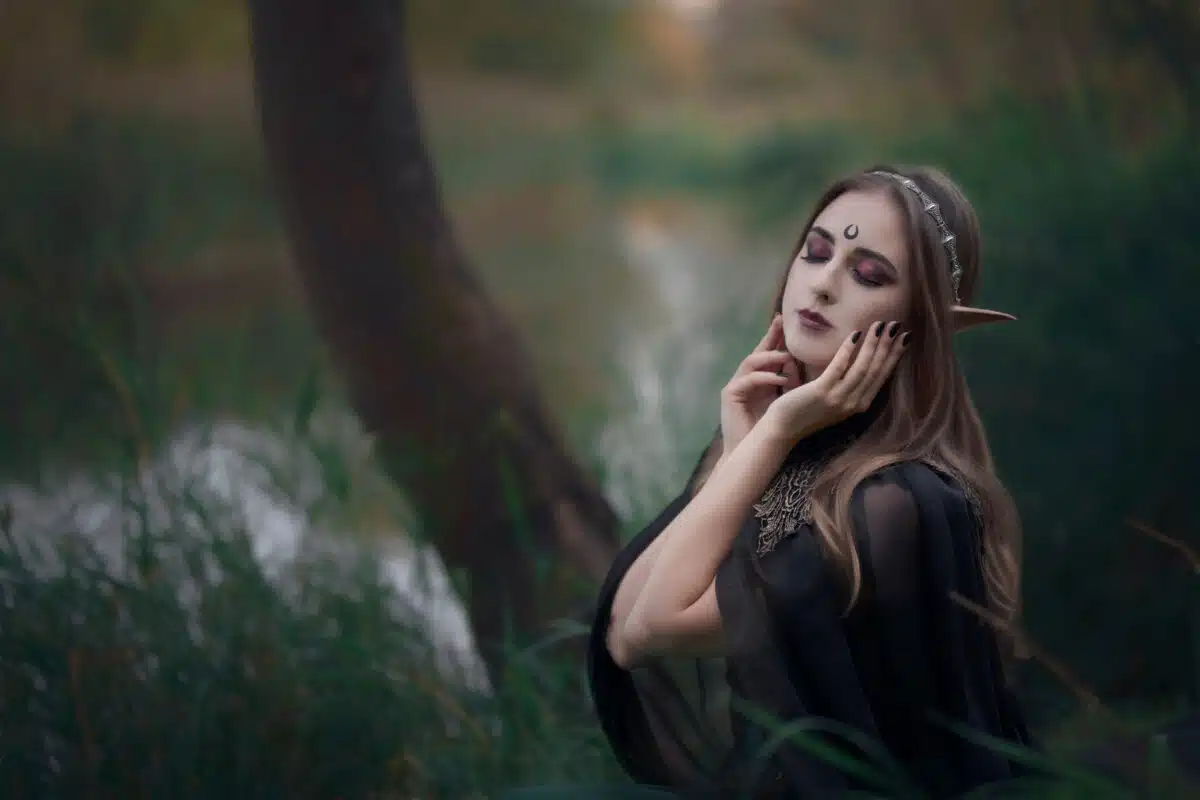
“Disappointment” by Sophie M. Almon Hensley
The light has left the hill-side. Yesterday
These skies shewed blue against the dusky trees,
The leaves’ soft murmur in the evening breeze
Was music, and the waves danced in the bay.
Then was my heart, as ever, far away
With you, – and I could see you as one sees
A mirrored face, – and happiness and ease
And hope were mine, in spite of long delay.
After these months of waiting, this is all!
Hope, dead, lies coffined, shrouded in despair,
With all the blessings of the outer air
Forgot, ‘neath the black covering of a pall.
Only the darkening of the woodland ways,
A heart’s low moaning over wasted days.
“The Disappointment” by John Clare
“Ah, where can he linger?” said Doll, with a sigh,
As bearing her milk-burthen home:
“Since he’s broken his vow, near an hour has gone by,
So fair as he promis’d to come.”
-She’d fain had him notice the loudly-clapt gate,
And fain call’d him up to her song;
But while her stretch’d shade prov’d the omen too late,
Heavy-hearted she mutter’d along.
She look’d and she listen’d, and sigh follow’d sigh,
And jealous thoughts troubled her head;
The skirts of the pasture were losing the eye,
As eve her last finishing spread;
And hope, so endearing, was topmost to see,
As ‘tween-light was cheating the view,
Every thing at a distance–a bush, or a tree,
Her love’s pleasing picture it drew.
The pasture-gate creak’d, pit-a-pat her heart went,
Fond thrilling with hope’s pleasing pain,
She certainly thought that a signal it meant,
So she turn’d, to be cheated again;
Expectations and wishes throbb’d warm to her side,
But soon the sweet feeling was lost,
Chill damps quick ensuing, when nigh she descried
Her idle cows rubbing the post.
By fancy soon tickled, by hopes led astray,
Again did she hope, but in vain;–
A twitch at her sleeve!–’twas the shepherd’s fond way,
And she look’d o’er her shoulder again;
But a bramble had caught at her gown passing by;
Disappointment, how great is thy smart!
How deep was the sorrow explain’d in that sigh,
Like a bramble-thorn twang’d through her heart!
Quite wearied she soodled along through the dew,
And oft look’d and listen’d around,
And loudly she clapt every gate she came through,
To call her lost love to the sound;
And whenever to rest she her buckets set down,
She jingled her yokes to and fro,
And her yokes she might jingle till morn–a rude clown,
Ere he it seem’d offered to go.
Passing maids wonder’d much as she came to the town,
To see her so still on her way;–
She ne’er stopt to name a young man or new gown,
So much as she used to say:
Some ask’d if her tongue she had lost on the plain,
Some enquir’d if she ow’d any spite;
But short were the answers she made them again,
“Yes,” or “no,” and a mutter’d “good night.”
She’d cause to be silent, and knew it too well,
And said to herself passing by,
“Disappointments like mine if to you they befel,
Ye would then be as sulky as I.”
Now nigh home and Roger, her bosom glow’d hot,
And jealousies rose on her cheek;
She’d be bound his delay a new sweetheart had got,
And if he came now she’d not speak.
She sat herself down soon as got in the house,
No dossity in her to stir;
The cat at her presence left watching the mouse,
And the milk she might lap it for her,
Eat it all an she would, for she car’d not a pin,
She’d other fish frying as then;
And soon as chance offer’d that she could begin,
She ‘gan weigh her doubts to her sen.
“Ah, the gipsy, she told me my fortune last night,
Too true have I prov’d what she said:
‘You love him too warmly that loves you too light,’
And grievous she shaked her head;
‘He scorns you–the lines of your hands,’ she said, ‘meet,’
I was fit to drop under my cow;
‘It’s as plain as the nose on your face for to see’t,’
I could not believe it till now.
“How could I, when now but a day or two’s gone,
Since he fuss’d me so up in the grove,
And preach’d like a parson as leading me on,
And seem’d like a saint fall’n in love?
He smilingly bid me behold the stiff bean,
How it held up the weak winding pea,–
‘And so on my arm,’ said he, ‘Dolly may lean,
For I’ll be a prop unto thee.’
“And oft did he shew me, as proofs of his love,
The gate, and the stile, where we came,
And many a favourite tree in the grove,
Where he had been marking my name:
And these made him staunch in my foolish esteem;
But deuce take such provings, forsooth,
They’re like flimsy nick-nacks, that cheat in a dream,
When the morning sun wakes with the truth.
Last week I the first time ‘gan doubt his respect,
When at market he left me behind;
He made no excuses to hide his neglect,
Plain proof that he’d changed his mind:
When I said how I loiter’d in hopes he would come,
And when all my troubles he learn’d,
How late and how wet I was ere I got home,
He ne’er seem’d a morsel concern’d.
“And magpies that chatter’d, no omen so black,
The dreams of my being a bride,
Odd crows that are constantly fix’d in my track,
Plain prov’d that bad luck would betide:
The coffin-spark burning my holiday-gown,
As nothing’s so certain a sign;
The knives I keep crossing whenever laid down,
Were proofs of these sorrows of mine.
“A good-for-nought looby, he nettled me sore,
I minded him oft when at church,
How under the wenches’ fine bonnets he’d glower,
As smiling they came in the porch:
Lord knows, scores of times he has made me to sin,
For, being so bother’d and vex’d,
‘Bout the parson’s good preaching I car’d not a pin,
And never once thought of the text.
“Like a fool, with full many a lying excuse,
To see him I’ve stole in the street,
And drest to entice him; but all’s of no use,
‘Tis folly such things to repeat:
No, no, his behaviour, a good-for-nought chap,
I’ll see no uneasiness in it;
The wreath he last bought me, to dress my new cap,
I’ll burn it to ashes this minute.”
Thus she vented her griefs, and gave ease to her sighs,
Till the tinkled latch startled her dumb,
And ended her tale in a pause of surprise,
While hope whisper’d comfort, “he’s come!”
He enter’d, and begg’d she’d excuse the late hour,
She doubts his assertions awhile,
Then as the glad sun breaks the clouds in a shower,
Tears melt in a welcoming smile.
Ah, sad disappointment! your damp chilly pain
And all jealous doubts you impart,
Description but mixes her colours in vain
To picture your horrors at heart.
Gall’d jealousy, like as the tide, ebbs to rest,
Subsiding as gradually o’er;
Contented she smother’d her sighs on his breast,
And the kiss seem’d as sweet as before.
“Disillusion” by Victoria Mary Sackville-West
I wrote the burning words to you
That meant so much to me.
I sent them speeding straight to you,
To you across the sea;
I waited with sure reckoning
For your reply to me.
I waited, and the counted day
Fruitlessly came and went;
I made excuse for the delay,
Pitiable confident.
I knew to-morrow’s light must bring
The words you must have sent.
And still I stand on that dim verge
And look across the sea;
The waves have changed into a dirge
Their volubility.
And in my disillusioned heart
Is a little grave for me.
But still with shaded eyes I gaze
As mournfully I sing,
And one by one the trailing days,
As they no message bring,
Fall with their slow monotony
As beads fall from a string.

“The Beautiful” by John Aylmer Dorgan
The beautiful, which mocked his fond pursuing,
The poet followed long;
With passionate purpose the shy shadow wooing,
And soul-betraying song.
And still the fervor of his fond endeavor
To him seemed poured in vain,
And all in vain, forever and forever,
The sorrow of his strain.
But when at last he perished broken-hearted,
The world, grown dark and dull,
Bewailed the radiance with him departed
Who was the Beautiful.
“The Disappointment” by Aphra Behn
1.
One Day the Amarous Lisander,
By an impatient Passion sway’d,
Surpris’d fair Cloris, that lov’d Maid,
Who cou’d defend her self no longer ;
All things did with his Love conspire,
The gilded Planet of the Day,
In his gay Chariot, drawn by Fire,
War now descending to the Sea,
And left no Light to guide the World,
But what from Cloris brighter Eves was hurl’d.
2.
In alone Thicket, made for Love,
Silent as yielding Maids Consent,
She with a charming Languishment
Permits his force, yet gently strove ?
Her Hands his Bosom softly meet,
But not to put him back design’d,
Rather to draw him on inclin’d,
Whilst he lay trembling at her feet;
Resistance ’tis to late to shew,
She wants the pow’r to sav, Ah!what do you do?
3.
Her bright Eyes sweat, and yet Severe,
Where Love and Shame confus’dly strive,
Fresh Vigor to Lisander give :
And whispring softly in his Ear,
She Cry’d, Cease, cease, your vain desire,
Or I’ll call out, What wou’d you do ?
My dearer Honour, ev’n to you,
I cannot, must not give, retire,
Or take that Life whose chiefest part
I gave you with the Conquest of my Heart.
4.
But he as much unus’d to fear,
As he was capable of Love,
The blessed Minutes to improve,
Kisses her Lips, her Neck, her Hair !
Each touch her new Desires alarms !
His burning trembling Hand he prest
Upon her melting Snowy Breast,
While she lay panting in his Arms !
All her unguarded Beauties lie
The Spoils and Trophies of the Enemy.
5.
And now, without Respect or Fear,
He seeks the Objects of his Vows ;
His Love no Modesty allows :
By swift degrees advancing where
His daring Hand that Alter seiz’d,
Where Gods of Love do Sacrifice ;
That awful Throne, that Paradise,
Where Rage is tam’d, and Anger pleas’d ;
That Living Fountain, from whose Trills
The melted Soul in liquid Drops distils.
6.
Her balmy Lips encountring his,
Their Bodies as their Souls are joyn’d,
Where both in Transports were confin’d,
Extend themselves upon the Moss.
Cloris half dead and breathless lay,
Her Eyes appear’d like humid Light,
Such as divides the Day and Night;
Or falling Stars, whose Fires decay ;
And now no signs of Life she shows,
But what in short-breath-sighs returns and goes.
7.
He saw how at her length she lay,
He saw her rising Bosom bare,
Her loose thin Robes, through which appear
A Shape design’d for Love and Play;
Abandon’d by her Pride and Shame,
She do’s her softest Sweets dispence,
Offring her Virgin-Innocence
A Victim to Loves Sacred Flame ;
Whilst th’ or’e ravish’d Shepherd lies,
Unable to perform the Sacrifice.
8.
Ready to taste a Thousand Joys,
Thee too transported hapless Swain,
Found the vast Pleasure turn’d to Pain :
Pleasure, which too much Love destroys !
The willing Garments by he laid,
And Heav’n all open to his view ;
Mad to possess, himself he threw
On the defenceless lovely Maid.
But oh ! what envious Gods conspire
To snatch his Pow’r, yet leave him the Desire !
9.
Natures support, without whose Aid
She can no humane Being give,
It self now wants the Art to live,
Faintness it slacken’d Nerves invade :
In vain th’ enraged Youth assaid
To call his fleeting Vigour back,
No Motion ’twill from Motion take,
Excess of Love his Love betray’d ;
In vain he Toils, in vain Commands,
Th’ Insensible fell weeping in his Hands.
10.
In this so Am’rous cruel strife,
Where Love and Fate were too severe,
The poor Lisander in Despair,
Renounc’d his Reason with his Life.
Now all the Brisk and Active Fire
That should the Nobler Part inflame,
Unactive Frigid, Dull became,
And left no Spark for new Desire ;
Not all her Naked Charms cou’d move,
Or calm that Rage that had debauch’d his Love.
11.
Cloris returning from the Trance
Which Love and soft Desire had bred,
Her tim’rous Hand she gently laid,
Or guided by Design or Chance,
Upon that Fabulous Priapus,
That Potent God (as Poets feign.)
But never did young Shepherdess
(Garth’ring of Fern upon the Plain)
More nimbly draw her Fingers back,
Finding beneath the Verdant Leaves a Snake.
12.
Then Cloris her fair Hand withdrew,
Finding that God of her Desires
Disarm’d of all his pow’rful Fires,
And cold as Flow’rs bath’d in the Morning-dew.
Who can the Nymphs Confusion guess ?
The Blood forsook the kinder place,
And strew’d with Blushes all her Face,
Which both Disdain and Shame express ;
And from Lisanders Arms she fled,
Leaving him fainting on the gloomy Bed.
13.
Like Lightning through the Grove she hies,
Or Daphne from the Delphick God ;
No Print upon the Grassie Road
She leaves, t’ instruct pursuing Eyes.
The Wind that wanton’d in her Hair,
And with her ruffled Garments plaid,
Discover’d in the flying Maid
All that the Gods e’re made of Fair.
So Venus, when her Love was Slain,
With fear and haste flew o’re the fatal Plain.
14.
The Nymphs resentments, none but I
Can well imagin, and Condole ;
But none can guess Lisander’s Soul,
But those who sway’d his Destiny :
His silent Griefs, swell up to Storms,
And not one God, his Fury spares,
He Curst his Birth, his Fate, his Stars,
But more the Shepherdesses Charms ;
Whose soft bewitching influence,
Had Damn’d him to the Hell of Impotence.
“Come, Sorrow, Come” by Anonymous
Come, Sorrow, come, sit down and mourn with me;
Hang down thy head upon thy baleful breast,
That God and man and all the world may see
Our heavy hearts do live in quiet rest:
Enfold thine arms and wring thy wretched hands
To shew the State wherein poor Sorrow stands.
Cry not outright, for that were children’s guise,
But let thy tears fall trickling down thy face,
And weep so long until thy blubbered eyes
May see in sum the depth of thy disgrace.
Oh shake thy head, but not a word but mum;
The heart once dead, the tongue is stroken dumb.
And let our fare be dishes of despite
To break our hearts and not our fasts withal;
Then let us sup with sorrow-sops at night,
And bitter sauce all of a broken gall:
Thus let us live till heavens may rue to see
The doleful doom ordained for thee and me.

“Agatha” by Alfred Austin
She wanders in the April woods,
That glisten with the fallen shower;
She leans her face against the buds,
She stops, she stoops, she plucks a flower.
She feels the ferment of the hour:
She broodeth when the ringdove broods;
The sun and flying clouds have power
Upon her cheek and changing moods.
She cannot think she is alone,
As o’er her senses warmly steal
Floods of unrest she fears to own,
And almost dreads to feel.
Among the summer woodlands wide
Anew she roams, no more alone;
The joy she fear’d is at her side,
Spring’s blushing secret now is known.
The primrose and its mates have flown,
The thrush’s ringing note hath died;
But glancing eye and glowing tone
Fall on her from her god, her guide.
She knows not, asks not, what the goal,
She only feels she moves towards bliss,
And yields her pure unquestioning soul
To touch and fondling kiss.
And still she haunts those woodland ways,
Though all fond fancy finds there now
To mind of spring or summer days,
Are sodden trunk and songless bough.
The past sits widow’d on her brow,
Homeward she wends with wintry gaze,
To walls that house a hollow vow,
To hearth where love hath ceas’d to blaze:
Watches the clammy twilight wane,
With grief too fix’d for woe or tear;
And, with her forehead ’gainst the pane,
Envies the dying year.
“Lesbia” by Richard Aldington
Grow weary if you will, let me be sad.
Use no more speech now;
Let the silence spread gold hair above us,
Fold on delicate fold.
Use no more speech;
You had the ivory of my life to carve….
And Picus of Mirandola is dead;
And all the gods they dreamed and fabled of,
Hermes, and Thoth and Bêl are rotten now,
Rotten and dank.
And through it all I see your pale Greek face;
Tenderness
Makes me eager as a little child to love you,
You morsel left half-cold on Cæsar’s plate.
“Sorrows of Werther” by William Makepeace Thackeray
Werther had a love for Charlotte
Such as words could never utter;
Would you know how first he met her?
She was cutting bread and butter.
Charlotte was a married lady,
And a moral man was Werther,
And for all the wealth of Indies,
Would do nothing for to hurt her.
So he sigh’d and pined and ogled,
And his passion boil’d and bubbled,
Till he blew his silly brains out,
And no more was by it troubled.
Charlotte, having seen his body
Borne before her on a shutter,
Like a well-conducted person,
Went on cutting bread and butter.

“Lady Ann Bothwell’s Lament” by Anonymous
Balow, my babe, ly stil and sleipe!
It grieves me sair to see thee weipe;
If thoust be silent, Ise be glad,
Thy maining maks my heart ful sad.
Balow, my boy, thy mither’s joy!
Thy father breides me great annoy.
Balow, my ’babe, ly stil and sleipe!
It grieves me sair to see thee weipe.
When he began to court my luve,
And with his sugred words to muve,
His faynings fals and flattering cheire
To me that time did not appeire:
But now I see, most cruell hee,
Cares neither for my babe nor mee.
Balow, etc.
Ly stil, my darlinge, sleipe awhile,
And when thou wakest sweitly smile:
But smile not, as thy father did,
To cozen maids; nay, God forbid!
But yette I feire, thou wilt gae neire,
Thy fatheris hart and face to beire.
Balow, etc.
I cannae chuse, but ever will
Be luving to thy father stil:
Whaireir he gae, whaireir he ryde,
My luve with him maun stil abyde:
In weil or wae, whaireir he gae,
Mine hart can neir depart him frae.
Balow, etc.
But doe not, doe not, prettie mine,
To faynings fals thine hart incline;
Be loyal to thy luver trew,
And nevir change hir for a new;
If gude or faire, of hir have care,
For womens banning ’s wonderous sair.
Balow, etc.
Bairne, sin thy cruel father is gane,
Thy winsome smiles maun eise my paine;
My babe and I ’ll together live,
He ’ll comfort me when cares doe grieve;
My babe and I right saft will ly,
And quite forgeit man’s cruelty.
Balow, etc.
Fareweil, fareweil, thou falsest youth
That ever kist a woman’s mouth!
I wish all maids be warned by mee,
Nevir to trust man’s curtesy;
For if we doe but chance to bow,
They ’ll use us then they care not how.
Balow, my babe, ly stil and sleipe!
It grieves me sair to see thee weipe.
“The Despairing Lover” by William Walsh
Distracted with care,
For Phillis the fair;
Since nothing could move her,
Poor Damon, her lover,
Resolves in despair
No longer to languish,
Nor bear so much anguish;
But, mad with his love,
To a precipice goes;
Where, a leap from above
Would soon finish his woes.
When in rage he came there,
Beholding how steep
The sides did appear,
And the bottom how deep;
His torments projecting,
And sadly reflecting,
That a lover forsaken
A new love may get;
But a neck, when once broken,
Can never be set:
And, that he could die
Whenever he would;
But, that he could live
But as long as he could;
How grievous soever
The torment might grow,
He scorn’d to endeavour
To finish it so.
But bold, unconcern’d
At thoughts of the pain,
He calmly return’d
To his cottage again.
“The Course of True Love” by William Shakespeare
For aught that ever I could read,
Could ever hear by tale or history,
The course of true love never did run smooth:
But, either it was different in blood,
Or else misgraffèd in respect of years,
Or else it stood upon the choice of friends;
Or, if there were a sympathy in choice,
War, death, or sickness did lay siege to it,
Making it momentary as a sound,
Swift as a shadow, short as any dream;
Brief as the lightning in the collied night,
That, in a spleen, unfolds both heaven and earth,
And ere a man hath power to say,—Behold!
The jaws of darkness do devour it up:
So quick bright things come to confusion.

“Has summer come without the rose?” by Arthur William Edgar O’Shaughnessy
Has summer come without the rose,
Or left the bird behind?
Is the blue changed above thee,
O world! or am I blind?
Will you change every flower that grows,
Or only change this spot,
Where she who said, I love thee,
Now says, I love thee not?
The skies seemed true above thee,
The rose true on the tree;
The bird seemed true the summer through,
But all proved false to me.
World, is there one good thing in you,
Life, love, or death–or what?
Since lips that sang, I love thee,
Have said, I love thee not?
I think the sun’s kiss will scarce fall
Into one flower’s gold cup;
I think the bird will miss me,
And give the summer up.
O sweet place, desolate in tall
Wild grass, have you forgot
How her lips loved to kiss me,
Now that they kiss me not?
Be false or fair above me;
Come back with any face,
Summer!–do I care what you do?
You cannot change one place,–
The grass, the leaves, the earth, the dew,
The grave I make the spot,–
Here, where she used to love me,
Here, where she loves me not.
“Linda to Hafed” by Thomas Moore
‘How sweetly,’ said the trembling maid,
Of her own gentle voice afraid,
So long had they in silence stood,
Looking upon that moonlight flood,–
‘How sweetly does the moonbeam smile
To-night upon yon leafy isle!
Oft in my fancy’s wanderings,
I’ve wished that little isle had wings,
And we, within its fairy bowers,
Were wafted off to seas unknown,
Where not a pulse should beat but ours,
And we might live, love, die alone!
Far from the cruel and the cold,–
Where the bright eyes of angels only
Should come around us, to behold
A paradise so pure and lonely!
Would this be world enough for thee?’–
Playful she turned, that he might see
The passing smile her cheek put on;
But when she marked how mournfully
His eyes met hers, that smile was gone;
And, bursting into heartfelt tears,
‘Yes, yes,’ she cried, ‘my hourly fears,
My dreams, have boded all too right,–
We part–forever part–to-night!
I knew, I knew it could not last,–
‘T was bright, ‘t was heavenly, but ‘t is past!
O, ever thus, from childhood’s hour,
I’ve seen my fondest hopes decay;
I never loved a tree or flower
But ‘t was the first to fade away.
I never nursed a dear gazelle,
To glad me with its soft black eye,
But when it came to know me well,
And love me, it was sure to die!
Now, too, the joy most like divine
Of all I ever dreamt or knew,
To see thee, hear thee, call thee mine,–
O misery! must I lose that too?’
“Love Not” by Caroline Elizabeth Sarah Norton
Love not, love not! ye hapless sons of clay!
Hope’s gayest wreaths are made of earthly flowers—
Things that are made to fade and fall away
Ere they have blossom’d for a few short hours.
Love not!
Love not! the thing ye love may change:
The rosy lip may cease to smile on you,
The kindly-beaming eye grow cold and strange,
The heart still warmly beat, yet not be true.
Love not!
Love not! the thing you love may die,
May perish from the gay and gladsome earth;
The silent stars, the blue and smiling sky,
Beam o’er its grave, as once upon its birth.
Love not!
Love not! oh warning vainly said
In present hours as in the years gone by;
Love flings a halo round the dear ones’ head,
Faultless, immortal, till they change or die,
Love not!
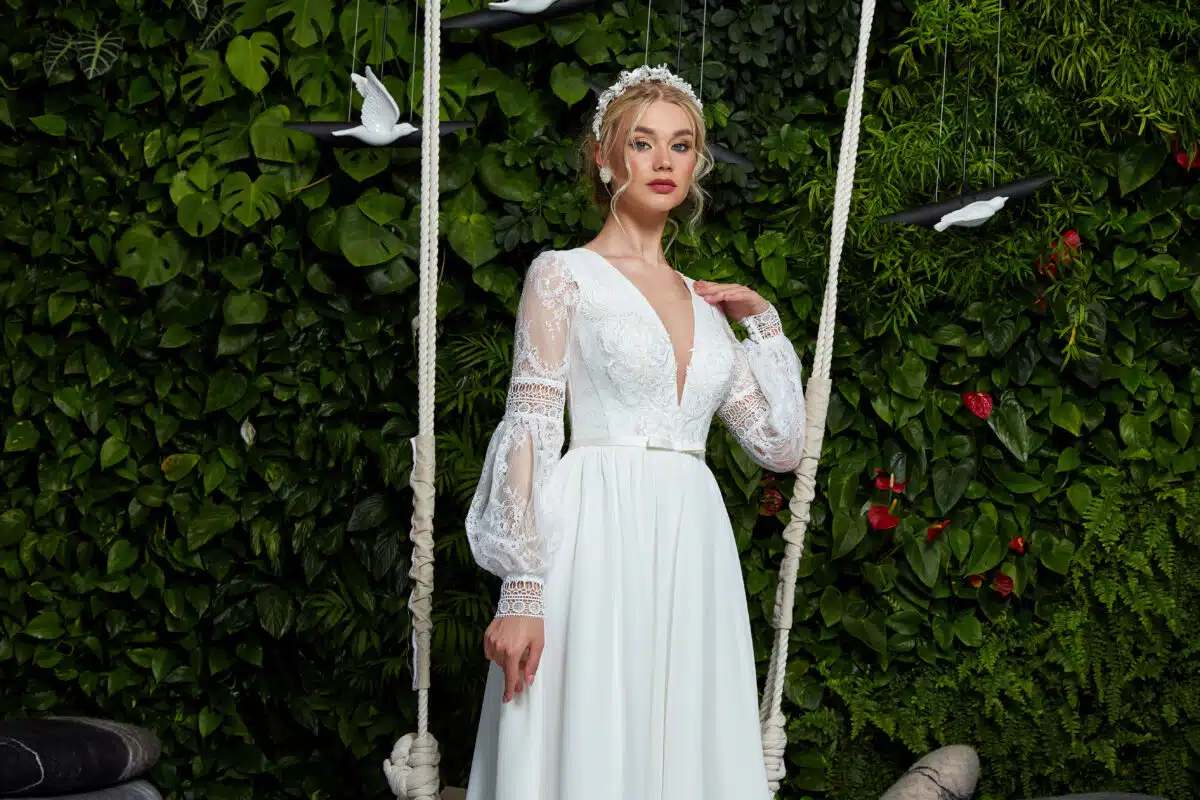
“To Diane de Poitiers” by Clément Marot
Farewell! since vain is all my care,
Far, in some desert rude,
I’ll hide my weakness, my despair:
And, ‘midst my solitude,
I’ll pray, that, should another move thee,
He may as fondly, truly love thee.
Adieu, bright eyes, that were my heaven!
Adieu, soft cheek, where summer blooms!
Adieu, fair form, earth’s pattern given,
Which Love inhabits and illumes!
Your rays have fallen but coldly on me:
One far less fond, perchance, had won ye!
“The Banks o’ Doon” by Robert Burns
Ye banks and braes o’ bonie Doon,
How can ye bloom sae fresh and fair?
How can ye chant, ye little birds,
And I sae weary fu’ o’ care!
Thou’ll break my heart, thou warbling bird,
That wantons thro’ the flowering thorn:
Thou minds me o’ departed joys,
Departed never to return.
Thou ’lt break my heart, thou bonnie bird,
That sings beside thy mate;
For sae I sat, and sae I sang,
And wistna o’ my fate.
Aft I rov’d by Bonie Doon,
To see the rose and woodbine twine:
And ilka bird sang o’ its luve,
And fondly sae did I o’ mine.
Wi’ lightsome heart I pu’d a rose,
Fu’ sweet upon its thorny tree!
Any my fause luver staw my rose,
But ah! he left the thorn wi’ me.
“A Broken Appointment” by Thomas Hardy
You did not come,
And marching Time drew on, and wore me numb.
Yet less for loss of your dear presence there
Than that I thus found lacking in your make
That high compassion which can overbear
Reluctance for pure lovingkindness’ sake
Grieved I, when, as the hope-hour stroked its sum,
You did not come.
You love not me,
And love alone can lend you loyalty;
-I know and knew it. But, unto the store
Of human deeds divine in all but name,
Was it not worth a little hour or more
To add yet this: Once you, a woman, came
To soothe a time-torn man; even though it be
You love not me.
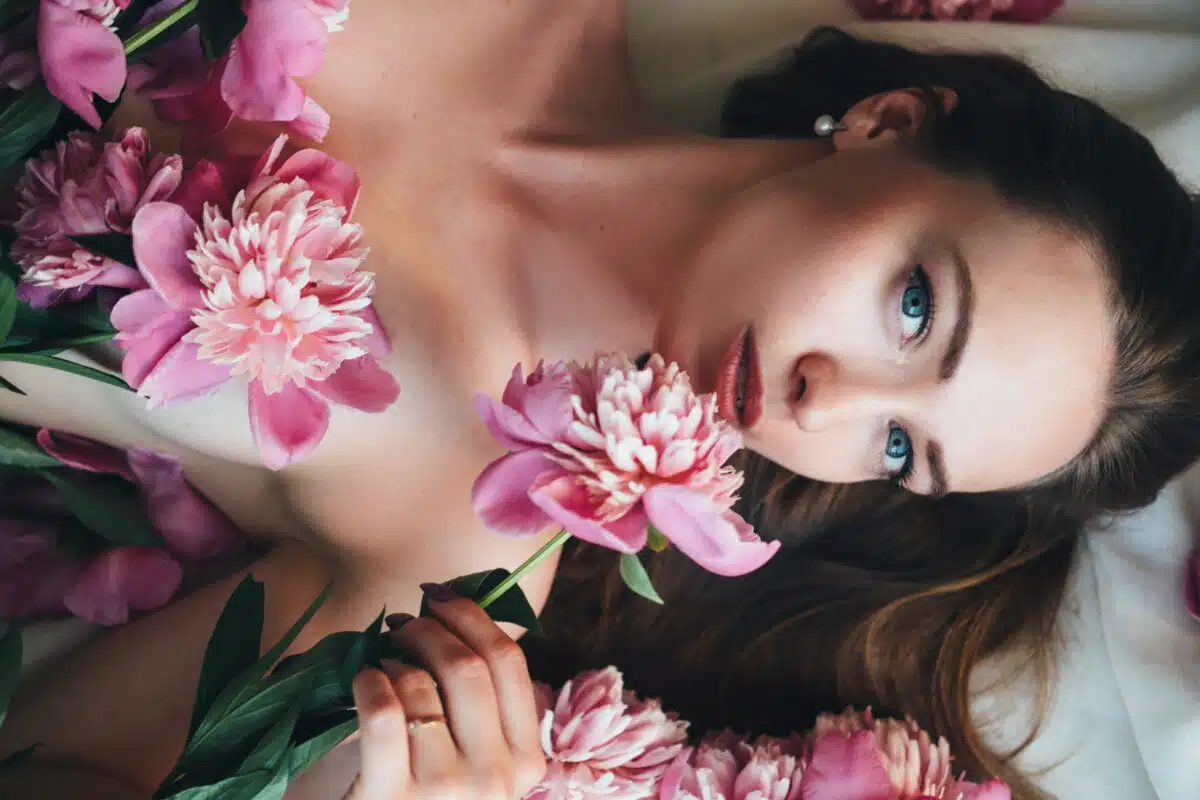
“Take, O, take those lips away” by William Shakespeare
Take, O, take those lips away,
That so sweetly were forsworn;
And those eyes, like break of day,
Lights that do mislead the morn;
But my kisses bring again,
Seals of love, but sealed in vain.
Hide, O, hide those hills of snow
Which thy frozen bosom bears,
On whose tops the pinks that grow
Are yet of those that April wears!
But first set my poor heart free,
Bound in those icy chains by thee.
“Song: A weary lot is thine, fair maid” by Sir Walter Scott
A weary lot is thine, fair maid,
A weary lot is thine!
To pull the thorn thy brow to braid,
And press the rue for wine.
A lightsome eye, a soldier’s mien,
A feather of the blue,
A doublet of the Lincoln green-
No more of me ye knew,
My Love!
No more of me ye knew.
‘This morn is merry June, I trow,
The rose is budding fain;
But she shall bloom in winter snow
Ere we two meet again.’
-He turn’d his charger as he spake
Upon the river shore,
He gave the bridle-reins a shake,
Said ‘Adieu for evermore,
My Love!
And adieu for evermore.’
“Auld Robin Gray” by Lady Anne (Lindsay) Barnard
When the sheep are in the fauld and the kye a’ at hame,
When a’ the weary world to sleep are gane,
The waes o’ my heart fa’ in showers frae my e’e,
While my gudeman lies sound by me.
Young Jamie lo’ed me weel, and sought me for his bride;
But saving a crown, he had naething else beside.
To mak’ the crown a pound, my Jamie gaed to sea;
And the crown and the pound, they were baith for me!
He hadna been awa’ a week but only twa,
When my mither she fell sick, and the cow was stown awa;
My father brak his arm—my Jamie at the sea—
And Auld Robin Gray came a-courtin’ me.
My father couldna work,—my mither couldna spin;
I toiled day and night, but their bread I couldna win;
And Rob maintained them baith, and, wi’ tears in his e’e,
Said, “Jennie for their sakes, will you marry me?”
My heart it said na, for I looked for Jamie back;
But hard blew the winds, and his ship was a wrack;
His ship was a wrack! Why didna Jamie dee?
Or why was I spared to cry, Wae is me!
My father argued sair—my mither didna speak,
But she looked in my face till my heart was like to break;
They gied him my hand, but my heart was in the sea;
And so Auld Robin Gray, he was gudeman to me.
I hadna been his wife, a week but only four,
When, mournfu’ as I sat on the stane at the door,
I saw my Jamie’s ghaist—I couldna think it he,
Till he said, “I ’m come hame, love, for to marry thee!”
O sair, sair did we greet, and mickle did we say:
Ae kiss we took—nae mair—I bad him gang away.
I wish that I were dead, but I ’m no like to dee,
And why do I live to say, Wae is me!
I gang like a ghaist, and I carena to spin;
I darena think o’ Jamie, for that wad be a sin.
But I will do my best a gude wife aye to be,
For Auld Robin Gray, he is kind unto me.
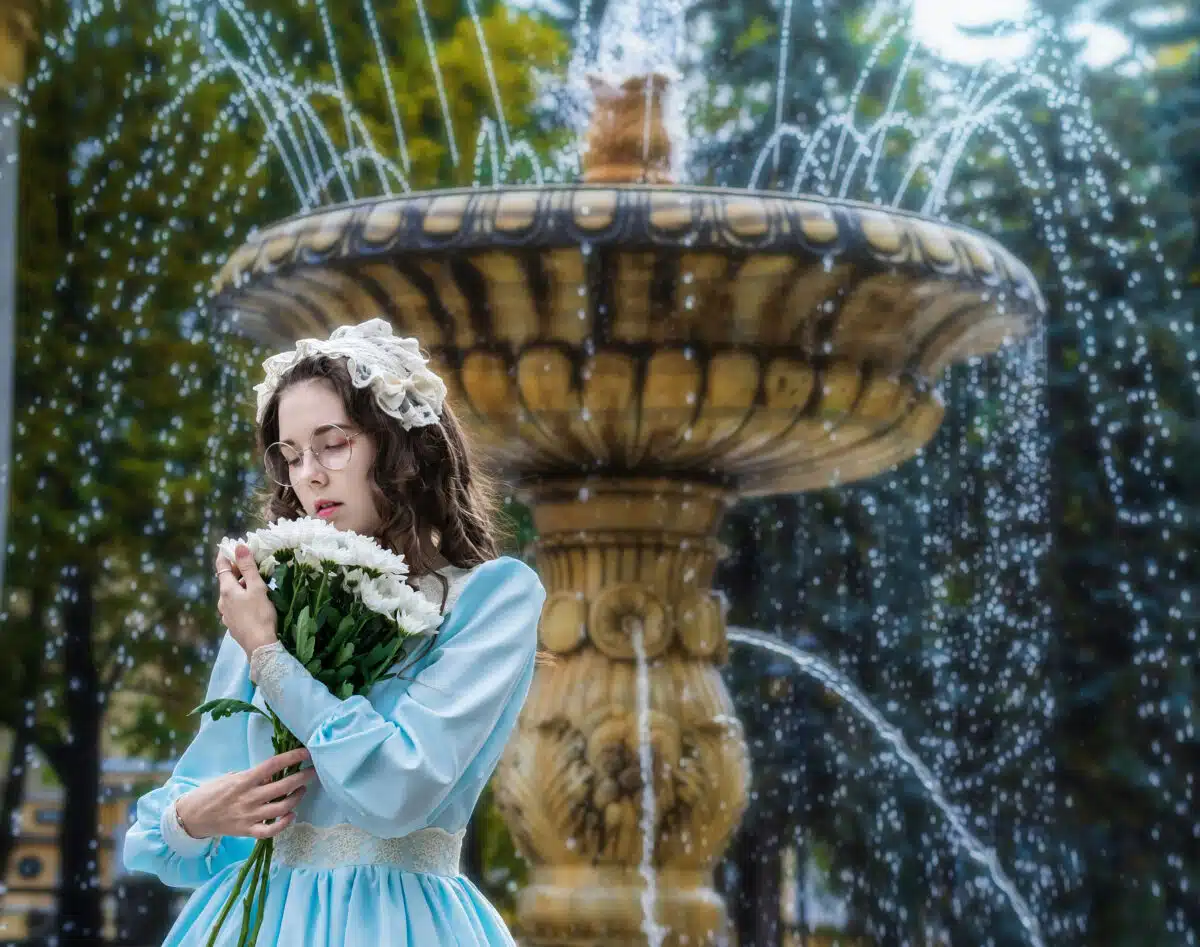
“Woman’s Inconstancy” by Sir Robert Ayton
I loved thee once, I ’ll love no more,
Thine be the grief as is the blame;
Thou art not what thou wast before,
What reason I should be the same?
He that can love unloved again,
Hath better store of love than brain:
God sends me love my debts to pay,
While unthrifts fool their love away.
Nothing could have my love o’erthrown,
If thou hadst still continued mine;
Yea, if thou hadst remained thy own,
I might perchance have yet been thine.
But thou thy freedom didst recall,
That if thou might elsewhere inthrall;
And then how could I but disdain
A captive’s captive to remain?
When new desires had conquered thee,
And changed the object of thy will,
It had been lethargy in me,
Not constancy, to love thee still.
Yea, it had been a sin to go
And prostitute affection so,
Since we are taught no prayers to say
To such as must to others pray.
Yet do thou glory in thy choice,
Thy choice of his good fortune boast;
I ’ll neither grieve nor yet rejoice,
To see him gain what I have lost;
The height of my disdain shall be,
To laugh at him, to blush for thee;
To love thee still, but go no more
A begging to a beggar’s door.
“To a Portrait” by Arthur Symons
A pensive photograph
Watches me from the shelf—
Ghost of old love, and half
Ghost of myself!
How the dear waiting eyes
Watch me and love me yet—
Sad home of memories,
Her waiting eyes!
Ghost of old love, wronged ghost,
Return: though all the pain
Of all once loved, long lost,
Come back again.
Forget not, but forgive!
Alas, too late I cry.
We are two ghosts that had their chance to live,
And lost it, she and I.
“Maud Muller” by John Greenleaf Whittier
Maud Muller, on a summer’s day,
Raked the meadows sweet with hay.
Beneath her torn hat glowed the wealth
Of simple beauty and rustic health.
Singing, she wrought, and her merry glee
The mock-bird echoed from his tree.
But, when she glanced to the far-off town,
White from its hill-slope looking down,
The sweet song died, and a vague unrest
And a nameless longing filled her breast–
A wish, that she hardly dared to own,
For something better than she had known.
The Judge rode slowly down the lane,
Smoothing his horse’s chestnut mane.
He drew his bridle in the shade
Of the apple-trees, to greet the maid,
And ask a draught from the spring that flowed
Through the meadow across the road.
She stooped where the cool spring bubbled up,
And filled for him her small tin cup,
And blushed as she gave it, looking down
On her feet so bare, and her tattered gown.
“Thanks!” said the Judge, “a sweeter draught
From a fairer hand was never quaffed.”
He spoke of the grass and flowers and trees,
Of the singing birds and the humming bees;
Then talked of the haying, and wondered whether
The cloud in the west would bring foul weather.
And Maud forgot her briar-torn gown,
And her graceful ankles bare and brown;
And listened, while a pleasant surprise
Looked from her long-lashed hazel eyes.
At last, like one who for delay
Seeks a vain excuse, he rode away,
Maud Muller looked and sighed: “Ah, me!
That I the Judge’s bride might be!
“He would dress me up in silks so fine,
And praise and toast me at his wine.
“My father should wear a broadcloth coat;
My brother should sail a painted boat.
“I’d dress my mother so grand and gay,
And the baby should have a new toy each day.
“And I’d feed the hungry and clothe the poor,
And all should bless me who left our door.”
The Judge looked back as he climbed the hill,
And saw Maud Muller standing still.
“A form more fair, a face more sweet,
Ne’er hath it been my lot to meet.
“And her modest answer and graceful air
Show her wise and good as she is fair.
“Would she were mine, and I to-day,
Like her, a harvester of hay:
“No doubtful balance of rights and wrongs,
Nor weary lawyers with endless tongues,
“But low of cattle, and song of birds,
And health, and quiet, and loving words.”
But he thought of his sisters, proud and cold,
And his mother, vain of her rank and gold.
So, closing his heart, the Judge rode on,
And Maud was left in the field alone.
But the lawyers smiled that afternoon,
When he hummed in court an old love-tune;
And the young girl mused beside the well,
Till the rain on the unraked clover fell.
He wedded a wife of richest dower,
Who lived for fashion, as he for power.
Yet oft, in his marble hearth’s bright glow,
He watched a picture come and go:
And sweet Maud Muller’s hazel eyes
Looked out in their innocent surprise.
Oft when the wine in his glass was red,
He longed for the wayside well instead;
And closed his eyes on his garnished rooms,
To dream of meadows and clover-blooms.
And the proud man sighed, with a secret pain,
“Ah, that I were free again!
“Free as when I rode that day,
Where the barefoot maiden raked her hay.”
She wedded a man unlearned and poor,
And many children played round her door.
But care and sorrow, and child-birth pain,
Left their traces on heart and brain.
And oft, when the summer sun shone hot
On the new-mown hay in the meadow lot,
And she heard the little spring brook fall
Over the roadside, through the wall,
In the shade of the apple-tree again
She saw a rider draw his rein,
And, gazing down with timid grace,
She felt his pleased eyes read her face.
Sometimes her narrow kitchen walls
Stretched away into stately halls;
The weary wheel to a spinnet turned,
The tallow candle an astral burned;
And for him who sat by the chimney lug,
Dozing and grumbling o’er pipe and mug,
A manly form at her side she saw,
And joy was duty and love was law.
Then she took up her burden of life again,
Saying only, “It might have been.”
Alas for maiden, alas for Judge,
For rich repiner and household drudge!
God pity them both! and pity us all,
Who vainly the dreams of youth recall;
For of all sad words of tongue or pen,
The saddest are these: “It might have been!”
Ah, well! for us all some sweet hope lies
Deeply buried from human eyes;
And, in the hereafter, angels may
Roll the stone from its grave away!
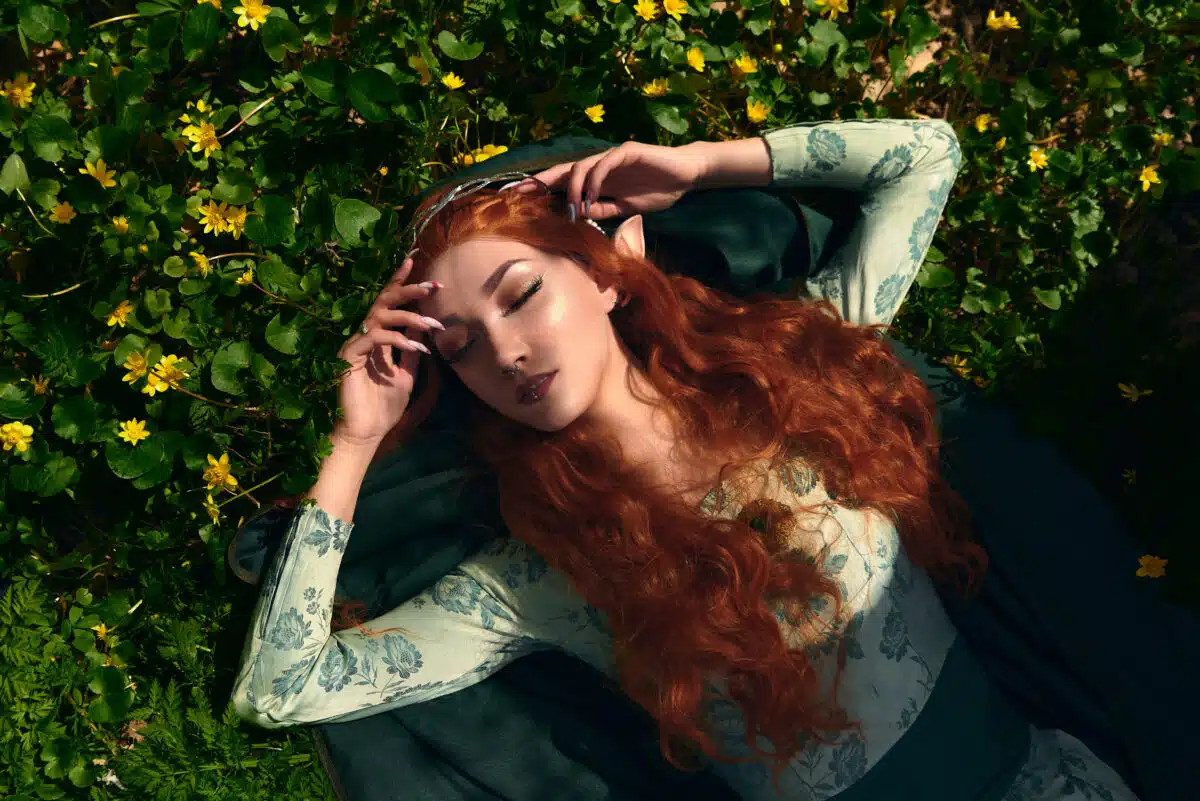
“Only a Woman” by Dinah Maria Mulock Craik
So, the truth ’s out. I ’ll grasp it like a snake,—
It will not slay me. My heart shall not break
Awhile, if only for the children’s sake.
For his, too, somewhat. Let him stand unblamed;
None say, he gave me less than honor claimed,
Except—one trifle scarcely worth being named—
The heart. That ’s gone. The corrupt dead might be
As easily raised up, breathing,—fair to see,
As he could bring his whole heart back to me.
I never sought him in coquettish sport,
Or courted him as silly maidens court,
And wonder when the longed-for prize falls short.
I only loved him,—any woman would:
But shut my love up till he came and sued,
Then poured it o’er his dry life like a flood.
I was so happy I could make him blest!—
So happy that I was his first and best,
As he mine,—when he took me to his breast.
Ah me! if only then he had been true!
If for one little year, a month or two,
He had given me love for love, as was my due!
Or had he told me, ere the deed was done,
He only raised me to his heart’s dear throne—
Poor substitute—because the queen was gone!
O, had he whispered, when his sweetest kiss
Was warm upon my mouth in fancied bliss,
He had kissed another woman even as this,—
It were less bitter! Sometimes I could weep
To be thus cheated, like a child asleep;—
Were not my anguish far too dry and deep.
So I built my house upon another’s ground;
Mocked with a heart just caught at the rebound,—
A cankered thing that looked so firm and sound.
And when that heart grew colder,—colder still,
I, ignorant, tried all duties to fulfil,
Blaming my foolish pain, exacting will,
All,—anything but him. It was to be
The full draught others drink up carelessly
Was made this bitter Tantalus-cup for me.
I say again,—he gives me all I claimed,
I and my children never shall be shamed:
He is a just man,—he will live unblamed.
Only—O God, O God, to cry for bread,
And get a stone! Daily to lay my head
Upon a bosom where the old love ’s dead!
Dead?—Fool! It never lived. It only stirred
Galvanic, like an hour-cold corpse. None heard:
So let me bury it without a word.
He ’ll keep that other woman from my sight.
I know not if her face be foul or bright;
I only know that it was his delight—
As his was mine; I only know he stands
Pale, at the touch of their long-severed hands,
Then to a flickering smile his lips commands,
Lest I should grieve, or jealous anger show.
He need not. When the ship ’s gone down, I trow,
We little reck whatever wind may blow.
And so my silent moan begins and ends,
No world’s laugh or world’s taunt, no pity of friends
Or sneer of foes, with this my torment blends.
None knows,—none heeds. I have a little pride;
Enough to stand up, wifelike, by his side,
With the same smile as when I was his bride.
And I shall take his children to my arms;
They will not miss these fading, worthless charms;
Their kiss—ah! unlike his—all pain disarms.
And haply as the solemn years go by,
He will think sometimes, with regretful sigh,
The other woman was less true than I.
“Waly, waly” by Anonymous
O waly, waly, up the bank,
O waly, waly, doun the brae,
And waly, waly, yon burn-side,
Where I and my love were wont to gae!
I leaned my back unto an aik,
I thocht it was a trustie tree,
But first it bowed and syne it brak’,—
Sae my true love did lichtlie me.
O waly, waly, but love be bonnie
A little time while it is new!
But when it ’s auld it waxeth cauld,
And fadeth awa’ like the morning dew.
O wherefore should I busk my heid,
Or wherefore should I kame my hair?
For my true love has me forsook,
And says he ’ll never lo’e me mair.
Noo Arthur’s Seat sall be my bed,
The sheets sall ne’er be pressed by me;
Saint Anton’s well sall be my drink;
Since my true love’s forsaken me.
Martinmas wind, when wilt thou blaw,
And shake the green leaves off the tree?
O gentle death, when wilt thou come?
For of my life I am wearie.
’T is not the frost that freezes fell,
Nor blawing snaw’s inclemencie,
’T is not sic cauld that makes me cry;
But my love’s heart grown cauld to me.
When we cam’ in by Glasgow toun,
We were a comely sicht to see;
My love was clad in the black velvet,
An’ I mysel’ in cramasie.
But had I wist before I kissed
That love had been so ill to win,
I ’d locked my heart in a case o’ goud,
And pinn’d it wi’ a siller pin.
Oh, oh! if my young babe were born,
And set upon the nurse’s knee;
And I mysel’ were dead and gane,
And the green grass growing over me!
“A Woman’s Love” by John Hay
A sentinel angel sitting high in glory
Heard this shrill wail ring out from Purgatory:
“Have mercy, mighty angel, hear my story!
“I loved,–and, blind with passionate love, I fell.
Love brought me down to death, and death to Hell.
For God is just, and death for sin is well.
“I do not rage against his high decree,
Nor for myself do ask that grace shall be;
But for my love on earth who mourns for me.
“Great Spirit! Let me see my love again;
And comfort him one hour, and I were fain
To pay a thousand years of fire and pain.”
Then said the pitying angel, “Nay, repent
That wild vow! Look, the dial-finger’s bent
Down to the last hour of thy punishment!”
But still she wailed, “I pray thee, let me go!
I cannot rise to peace and leave him so.
O, let me soothe him in his bitter woe!”
The brazen gates ground sullenly ajar,
And upward, joyous, like a rising star,
She rose and vanished in the ether far.
But soon adown the dying sunset sailing,
And like a wounded bird her pinions trailing,
She fluttered back, with broken-hearted wailing.
She sobbed, “I found him by the summer sea
Reclined, his head upon a maiden’s knee,–
She curled his hair and kissed him. Woe is me!”
She wept, “Now let my punishment begin!
I have been fond and foolish. Let me in
To expiate my sorrow and my sin.”
The angel answered, “Nay, sad soul, go higher!
To be deceived in your true heart’s desire
Was bitterer than a thousand years of fire!”

“Regrets” by Mrs. Elizabeth Oakes Smith
Meseemed as I did walk a crystal wall
Translucent in the hue of rosy morn,
And saw Eurydice, from Orpheus torn,
Lift her white brow from out its heavy pall,
With sweet lips echoing his melodious call,
And following him, love-led and music-borne,—
A sharp and broken cry, and she was gone!
Thou fairest grief, thou saddest type of all
Our sorrowing kind! O lost Eurydice!
Thy deathful cry thrilled in mine every vein,
When Orpheus turned him back, thus losing thee.
His broken lute and melancholy plain
All time prolongs,—the still unceasing flow
Of unavailing grief, and a regretful woe.
“Modern Love: XXIX” by George Meredith
Am I failing? For no longer can I cast
A glory round about this head of gold.
Glory she wears, but springing from the mould;
Not like the consecration of the Past!
Is my soul beggared? Something more than earth
I cry for still: I cannot be at peace
In having Love upon a mortal lease.
I cannot take the woman at her worth!
Where is the ancient wealth wherewith I clothed
Our human nakedness, and could endow
With spiritual splendour a white brow
That else had grinned at me the fact I loathed?
A kiss is but a kiss now! and no wave
Of a great flood that whirls me to the sea.
But, as you will! we’ll sit contentedly,
And eat our pot of honey on the grave.
“Blighted Love” by Luís de Camões
Flowers are fresh, and bushes green,
Cheerily the linnets sing;
Winds are soft, and skies serene;
Time, however, soon shall throw
Winter’s snow
O’er the buxom breast of Spring!
Hope, that buds in lover’s heart,
Lives not through the scorn of years;
Time makes love itself depart;
Time and scorn congeal the mind,–
Looks unkind
Freeze affection’s warmest tears.
Time shall make the bushes green;
Time dissolve the winter snow;
Winds be soft, and skies serene;
Linnets sing their wonted strain:
But again
Blighted love shall never blow!

“Louise Smith” by Edgar Lee Masters
Herbert broke our engagement of eight years
When Annabelle returned to the village
From the Seminary, ah me!
If I had let my love for him alone
It might have grown into a beautiful sorrow –
Who knows? – filling my life with healing fragrance.
But I tortured it, I poisoned it,
I blinded its eyes, and it became hatred –
Deadly ivy instead of clematis.
And my soul fell from its support,
Its tendrils tangled in decay.
Do not let the will play gardener to your soul
Unless you are sure
It is wiser than your soul’s nature.
“The Portrait” by E. Robert Bulwer
Midnight past! Not a sound of aught
Through the silent house, but the wind at his prayers.
I sat by the dying fire, and thought
Of the dear dead woman upstairs.
A night of tears! for the gusty rain
Had ceased, but the eaves were dripping yet;
And the moon looked forth, as though in pain,
With her face all white and wet:
Nobody with me, my watch to keep,
But the friend of my bosom, the man I love:
And grief had sent him fast to sleep
In the chamber up above.
Nobody else, in the country place
All round, that knew of my loss beside,
But the good young Priest with the Raphael-face,
Who confessed her when she died.
That good young Priest is of gentle nerve,
And my grief had moved him beyond control;
For his lips grew white, as I could observe,
When he speeded her parting soul.
I sat by the dreary hearth alone:
I thought of the pleasant days of yore:
I said, “The staff of my life is gone:
The woman I loved is no more.
“On her cold dead bosom my portrait lies,
Which next to her heart she used to wear—
Haunting it o’er with her tender eyes
When my own face was not there.
“It is set all round with rubies red,
And pearls which a Peri might have kept.
For each ruby there my heart hath bled:
For each pearl my eyes have wept.”
And I said—“The thing is precious to me:
They will bury her soon in the churchyard clay;
It lies on her heart, and lost must be
If I do not take it away.”
I lighted my lamp at the dying flame,
And crept up the stairs that creaked for fright,
Till into the chamber of death I came,
Where she lay all in white.
The moon shone over her winding-sheet,
There stark she lay on her carven bed:
Seven burning tapers about her feet,
And seven about her head.
As I stretched my hand, I held my breath;
I turned as I drew the curtains apart:
I dared not look on the face of death:
I knew where to find her heart.
I thought at first, as my touch fell there,
It had warmed that heart to life, with love;
For the thing I touched was warm, I swear,
And I could feel it move.
’T was the hand of a man, that was moving slow
O’er the heart of the dead,—from the other side:
And at once the sweat broke over my brow.
“Who is robbing the corpse?” I cried.
Opposite me by the tapers’ light,
The friend of my bosom, the man I loved,
Stood over the corpse, and all as white,
And neither of us moved.
“What do you here, my friend?”… The man
Looked first at me, and then at the dead.
“There is a portrait here,” he began;
“There is. It is mine,” I said.
Said the friend of my bosom, “Yours, no doubt,
The portrait was, till a month ago,
When this suffering angel took that out,
And placed mine there, I know.”
“This woman, she loved me well,” said I.
“A month ago,” said my friend to me:
“And in your throat,” I groaned, “you lie!”
He answered,… “Let us see.”
“Enough!” I returned, “let the dead decide:
And whosesoever the portrait prove,
His shall it be, when the cause is tried,
Where Death is arraigned by Love.”
We found the portrait there, in its place:
We opened it by the tapers’ shine:
The gems were all unchanged: the face
Was—neither his nor mine.
“One nail drives out another, at least!
The face of the portrait there,” I cried,
“Is our friend’s, the Raphael-faced young Priest,
Who confessed her when she died.”
The setting is all of rubies red,
And pearls which a Peri might have kept.
For each ruby there my heart hath bled:
For each pearl my eyes have wept.
“The Worst Pangs of Sorrow” by William Wordsworth
Surprised by joy—impatient as the Wind
I turned to share the transport—Oh! with whom
But Thee, long buried in the silent Tomb,
That spot which no vicissitude can find?
Love, faithful love, recalled thee to my mind—
But how could I forget thee?—Through what power,
Even for the least division of an hour,
Have I been so beguiled as to be blind
To my most grievous loss!—That thought’s return
Was the worst pang that sorrow ever bore,
Save one, one only, when I stood forlorn,
Knowing my heart’s best treasure was no more;
That neither present time, nor years unborn
Could to my sight that heavenly face restore.
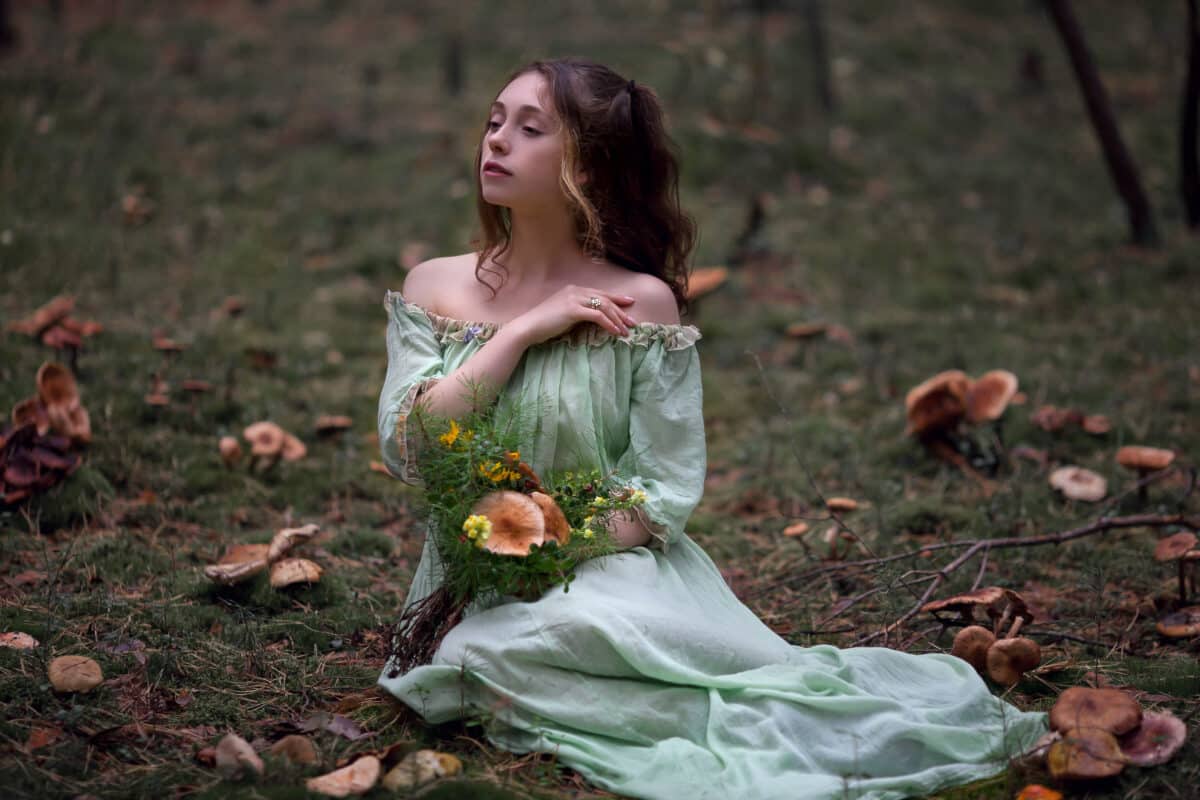
“Mag” by Carl Sandburg
I wish to God I never saw you, Mag.
I wish you never quit your job and came along with me.
I wish we never bought a license and a white dress
For you to get married in the day we ran off to a minister
And told him we would love each other and take care of
each other
Always and always long as the sun and the rain lasts anywhere.
Yes, I’m wishing now you lived somewhere away from here
And I was a bum on the bumpers a thousand miles away
dead broke.
I wish the kids had never come
And rent and coal and clothes to pay for
And a grocery man calling for cash,
Every day cash for beans and prunes.
I wish to God I never saw you, Mag.
I wish to God the kids had never come.
“Sonnet XXXI” by Giles Fletcher
Years, months, days, hours, in sighs I sadly spend.
I black the night, wherein I sleepless toss.
I love my griefs, yet wish them at an end.
Thus time’s expense increaseth but my loss.
I musing stand, and wonder at my Love;
That in so fair, should be a heart of steel.
And then I think, my fancy to remove:
But then more painful I my passions feel.
Thus must I love, sweet Fair, until I die;
And your unkindness doth my love increase:
I conquered am, I cannot it deny.
My life must end; yet shall my love not cease.
Then heavens, make LICIA fair most kind to me;
Or with my life, my love may finished be!
“Song: The bright tear of beauty, in sadness, is stealing” by Robert Waln
The bright tear of beauty, in sadness, is stealing,—
The gems of the east are less sparkling than these;
Her cheek is all flush’d with the anguish of feeling,—
Her white bosom carelessly bared to the breeze.
’Tis the bride of the soldier, and fancy had flourish’d
In day-dreams that circle the phantom of love,
For the visions of bliss that the maiden had nourish’d,
Her soul, in the warmth of its tenderness, wove.
But hark! ’tis the rush and the roaring of battle
That rolls on the lingering wings of the wind;
The sabres gleam bright; and the cannon’s loud rattle
Speaks death to the maiden left weeping behind.
The turf is his pillow; his mantle is heaven;
The warrior is sleeping the sleep of the brave!
The chains of affection are awfully riven,
And moulder away in the gloom of the grave.
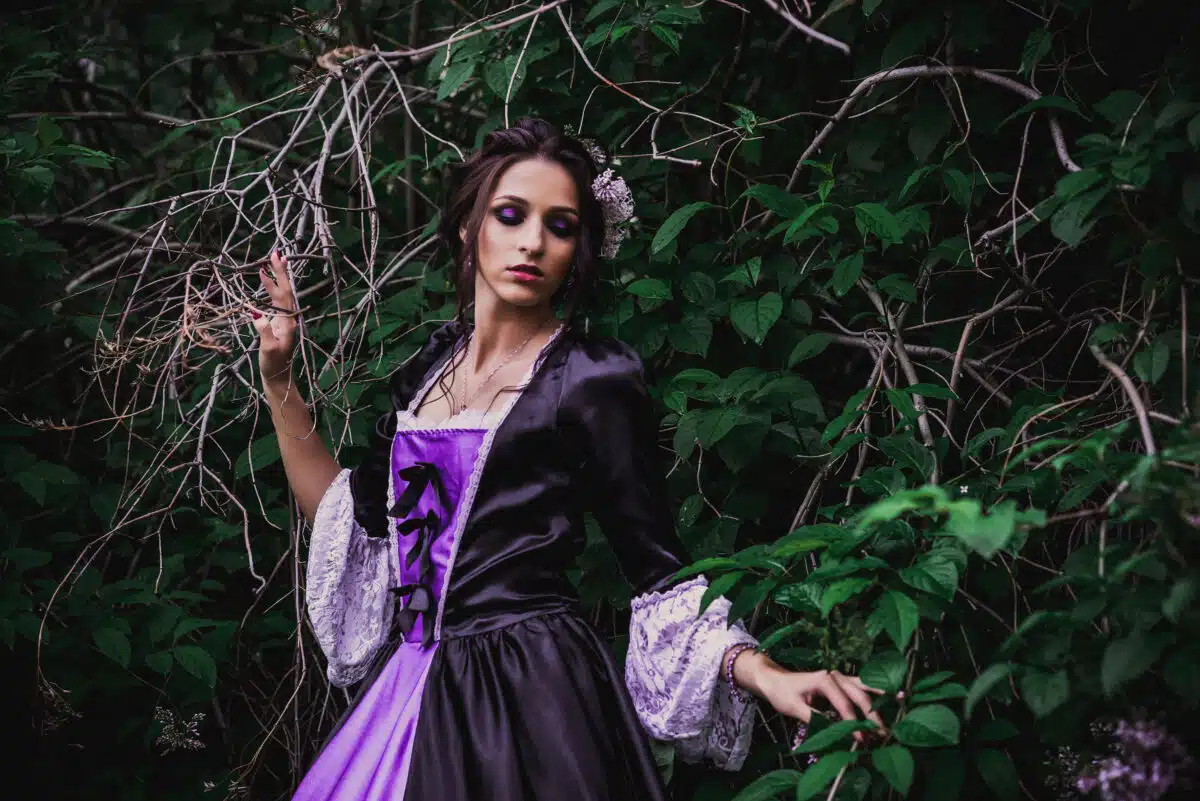
“Disappointment” by William Shenstone
Ye shepherds give ear to my lay,
And take no more heed of my sheep:
They have nothing to do but to stray;
I have nothing to do but to weep.
Yet do not my folly reprove;
She was fair — and my passion begun;
She smil’d — and I could not but love;
She is faithless — and I am undone.
Perhaps I was void of all thought:
Perhaps it was plain to foresee,
That a nymph so compleat would be sought
By a swain more engaging than me.
Ah! love ev’ry hope can inspire;
It banishes wisdom the while;
And the lip of the nymph we admire
Seems for ever adorn’d with a smile.
She is faithless, and I am undone;
Ye that witness the woes I endure;
Let reason instruct you to shun
What it cannot instruct you to cure.
Beware how you loiter in vain
Amid nymphs of an higher degree:
It is not for me to explain
How fair, and how fickle they be.
Alas! from the day that we met,
What hope of an end to my woes?
When I cannot endure to forget
The glance that undid my repose.
Yet time may diminish the pain:
The flow’r, and the shrub, and the tree,
Which I rear’d for her pleasure in vain,
In time may have comfort for me.
The sweets of a dew-sprinkled rose,
The sound of a murmuring stream,
The peace which from solitude flows,
Henceforth shall be Corydon’s theme.
High transports are shewn to the sight,
But we are not to find them our own;
Fate never bestow’d such delight,
As I with my Phyllis had known.
O ye woods, spread your branches apace;
To your deepest recesses I fly;
I would hide with the beasts of the chace;
I would vanish from every eye.
Yet my reed shall resound thro’ the grove
With the same sad complaint it begun;
How she smil’d, and I could not but love;
Was faithless, and I am undone!
“A Broken Song” by Moira O’Neill
‘Where am I from?’ From the green hills of Erin.
‘Have I no song then?’ My songs are all sung.
‘What o’ my love?’ ‘Tis alone I am farin’.
Old grows my heart, an’ my voice yet is young.
‘If she was tall?’ Like a king’s own daughter.
‘If she was fair?’ Like a mornin’ o’ May.
When she’d come laughin’ ’twas the runnin’ wather,
When she’d come blushin’ ’twas the break o’ day.
‘Where did she dwell?’ Where one’st I had my dwellin’.
‘Who loved her best?’ There’s no one now will know.
‘Where is she gone?’ Och, why would I be tellin’!
Where she is gone there I can never go.
“Menelaus and Helen” by Rupert Brooke
I
Hot through Troy’s ruin Menelaus broke
To Priam’s palace, sword in hand, to sate
On that adulterous whore a ten years’ hate
And a king’s honour. Through red death, and smoke,
And cries, and then by quieter ways he strode,
Till the still innermost chamber fronted him.
He swung his sword, and crashed into the dim
Luxurious bower, flaming like a god.
High sat white Helen, lonely and serene.
He had not remembered that she was so fair,
And that her neck curved down in such a way;
And he felt tired. He flung the sword away,
And kissed her feet, and knelt before her there,
The perfect Knight before the perfect Queen.
II
So far the poet. How should he behold
That journey home, the long connubial years?
He does not tell you how white Helen bears
Child on legitimate child, becomes a scold,
Haggard with virtue. Menelaus bold
Waxed garrulous, and sacked a hundred Troys
’Twixt noon and supper. And her golden voice
Got shrill as he grew deafer. And both were old.
Often he wonders why on earth he went
Troyward, or why poor Paris ever came.
Oft she weeps, gummy-eyed and impotent;
Her dry shanks twitch at Paris’ mumbled name.
So Menelaus nagged; and Helen cried;
And Paris slept on by Scamander side.

“The Wild Swans” by Li Qingzhao (James Whitall, Translation)
Before daybreak the breezes whisper
through the trellis at my window;
they interrupt and carry off my dream,
and he of whom I dreamed
vanishes from me.
I climb upstairs
to look from the topmost window,
but with whom? . . .
I remember how I used to stir the fire
with my hairpin of jade
as I am doing now . . .
but the brasier holds nothing but ashes.
I turn to look at the mountain;
there is a thick mist,
a dismal rain,
and I gaze down at the wind-dappled river,
the river that flows past me forever
without bearing away my sorrow.
I have kept the rain of my tears
on the crape of my tunic;
with a gesture I fling these bitter drops
to the wild swans on the river,
that they may be my messengers.
“Last Words to Miriam” by D. H. Lawrence
Yours is the shame and sorrow
But the disgrace is mine;
Your love was dark and thorough,
Mine was the love of the sun for a flower
He creates with his shine.
I was diligent to explore you,
Blossom you stalk by stalk,
Till my fire of creation bore you
Shrivelling down in the final dour
Anguish—then I suffered a balk.
I knew your pain, and it broke
My fine, craftsman’s nerve;
Your body quailed at my stroke,
And my courage failed to give you the last
Fine torture you did deserve.
You are shapely, you are adorned,
But opaque and dull in the flesh,
Who, had I but pierced with the thorned
Fire-threshing anguish, were fused and cast
In a lovely illumined mesh.
Like a painted window: the best
Suffering burnt through your flesh,
Undressed it and left it blest
With a quivering sweet wisdom of grace: but now
Who shall take you afresh?
Now who will burn you free,
From your body’s terrors and dross,
Since the fire has failed in me?
What man will stoop in your flesh to plough
The shrieking cross?
A mute, nearly beautiful thing
Is your face, that fills me with shame
As I see it hardening,
Warping the perfect image of God,
And darkening my eternal fame.
“Herbert Marshall” by Edgar Lee Masters
All your sorrow, Louise, and hatred of me
Sprang from your delusion that it was wantonness
Of spirit and contempt of your soul’s rights
Which made me turn to Annabelle and forsake you.
You really grew to hate me for love of me,
Because I was your soul’s happiness,
Formed and tempered
To solve your life for you, and would not.
But you were my misery. If you had been
My happiness would I not have clung to you?
This is life’s sorrow:
That one can be happy only where two are;
And that our hearts are drawn to stars
Which want us not.

“A Spring Dirge” by Ameen Rihani
Sad, sad, sad —
In vain thou comest, Spring ;
Sad, sad, sad —
In vain thy birds all sing:
Perfumeless is thy rose ;
Thy breeze, which softly blows,
Disturbs my sea of woes,
Ay, Death is on the wing.
Gone, gone, gone —
Go seek her, mocking Spring ;
Gone, gone, gone —
Aside thy garlands fling ;
Destroy thy laughing bower ;
Call back an April shower
To weep with me this hour :
He came, not reckoning.
Love, love, love —
What sendest thou with Spring?
Love, love, love —
What tidings these birds bring!
They tell me they can hear
Thee, in a higher sphere ;
But can that dry a tear,
Or give mv wish a wing?
“A Description of the Sorrow of true Lovers’ parting” by Sir Thomas Wyatt
There was never nothing more me pain’d,
Nor more my pity mov’d,
As when my sweetheart her complain’d,
That ever she me lov’d.
Alas! the while!
With piteous look she said, and sight,
‘Alas! what aileth me?
To love, and set my wealth so light,
On him that loveth not me;
Alas! the while!
‘Was I not well void of all pain,
When that nothing me griev’d?
And now with sorrows I must complain,
And cannot be reliev’d,
Alas! the while!
‘My restful nights, and joyful days,
Since I began to love
Be take from me; all thing decays,
Yet can I not remove,
Alas! the while!’
She wept and wrung her hands withal,
The tears fell in my neck:
She turned her face, and let it fall;
And scarce therewith could speak:
Alas! the while!
Her pains tormented me so sore
That comfort had I none,
But cursed my fortune more and more
To see her sob and groan,
Alas! the while!
“Of the Pains and Sorrows caused by Love” by Sir Thomas Wyatt
What meaneth this! when I lie alone
I toss, I turn, I sigh, I groan;
My bed me seems as hard as stone:
What means this?
I sigh, I plain continually;
The clothes that on my bed do lie,
Always me think they lie awry;
What means this?
In slumbers oft for fear I quake;
For heat and cold I burn and shake;
For lack of sleep my head doth ake;
What means this?
A mornings then when I do rise,
I turn unto my wonted guise,
All day after muse and devise;
What means this?
And if perchance by me there pass,
She, unto whom I sue for grace,
The cold blood forsaketh my face;
What means this?
But if I sit near her by,
With loud voice my heart doth cry,
And yet my mouth is dumb and dry;
What means this?
To ask for help no heart I have;
My tongue doth fail what I should crave;
Yet inwardly I rage and rave;
What means this?
Thus have I passed many a year,
And many a day, though nought appear,
But most of that that most I fear;
What means this?
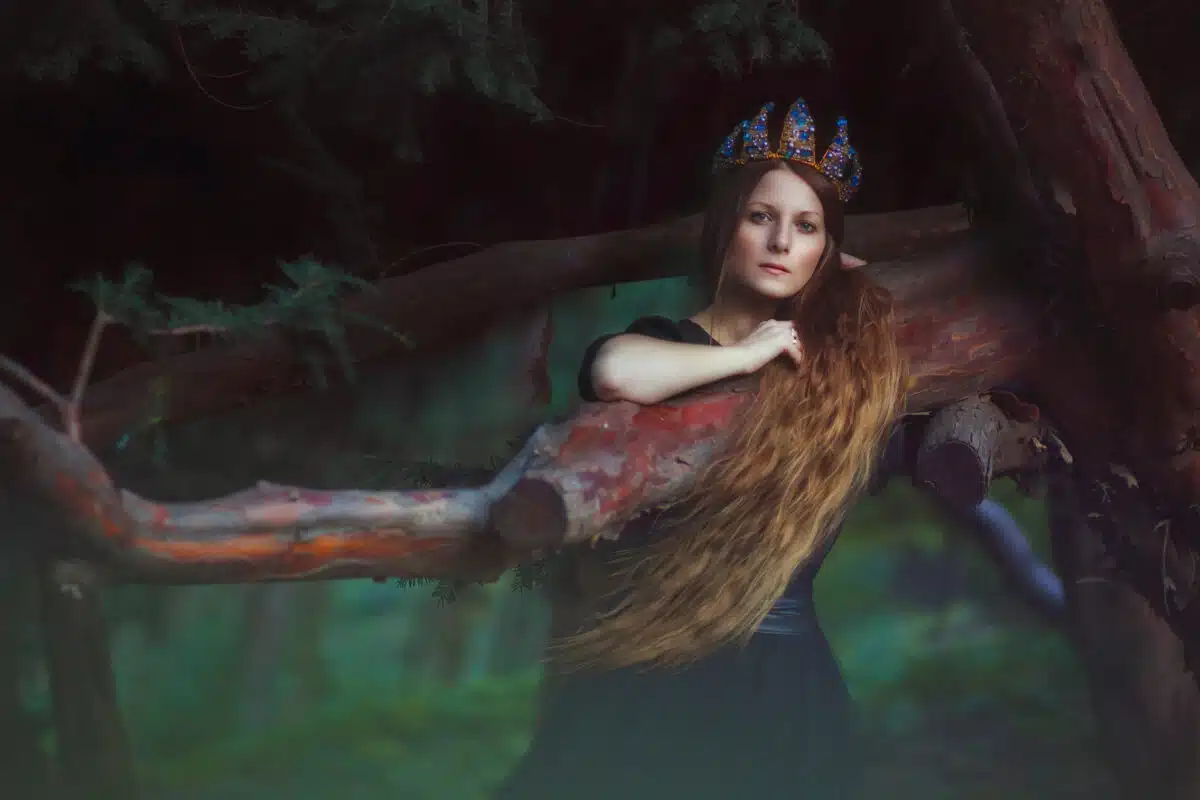
“The Sorrow of Love” by W. B. Yeats
The quarrel of the sparrows in the eaves,
The full round moon and the star-laden sky,
And the loud song of the ever-singing leaves,
Had hid away earth’s old and weary cry.
And then you came with those red mournful lips,
And with you came the whole of the world’s tears,
And all the sorrows of her labouring ships,
And all the burden of her myriad years.
And now the sparrows warring in the eaves,
The curd-pale moon, the white stars in the sky,
And the loud chaunting of the unquiet leaves
Are shaken with earth’s old and weary cry.
“The Nightingale” by Sir Philip Sidney
The nightingale, as soon as April bringeth
Unto her rested sense a perfect waking,
While late bare earth, proud of new clothing, springeth,
Sings out her woes, a thorn her song-book making,
And mournfully bewailing,
Her throat in tunes expresseth
What grief her breast oppresseth
For Tereus’ force on her chaste will prevailing.
O Philomela fair, O take some gladness,
That here is juster cause of plaintful sadness:
Thine earth now springs, mine fadeth;
Thy thorn without, my thorn my heart invadeth.
Alas, she hath no other cause of anguish
But Tereus’ love, on her by strong hand wroken,
Wherein she suffering, all her spirits languish;
Full womanlike complains her will was broken.
But I, who daily craving,
Cannot have to content me,
Have more cause to lament me,
Since wanting is more woe than too much having.
O Philomela fair, O take some gladness,
That here is juster cause of plaintful sadness:
Thine earth now springs, mine fadeth;
Thy thorn without, my thorn my heart invadeth.
“Regret” by Olivia Ward Bush-Banks
I said a thoughtless word one day,
A loved one heard and went away;
I cried: “Forgive me, I was blind;
I would not wound or be unkind.”
I waited long, but all in vain,
To win my loved one back again.
Too late, alas! to weep and pray,
Death came; my loved one passed away.
Then, what a bitter fate was mine;
No language could my grief define;
Tears of deep regret could not unsay
The thoughtless word I spoke that day.

“Her First Sorrow” by Ameen Rihani
‘T is but a score of hours when he didst swear
My sorrow and my joy to share.
Despite the fates, fore’er ;
But now he’s gone to cash again his he;
Others his shame with me will wear,
Why should I die?
Last night his hips my very feet didst burn ;
His kisses dropt, my love to earn,
Whichever way he’d turn ;
But now he’s gone another soul to rob.
Another heart to lure and spurn, ‘
Why should I sob?
He did not kiss me when he said good-bye ;
I let him go, not asking why,
Nor do I for him sigh ;
He’s gone another virgin breast to tear.
He’s gone on other lips to die,
Whv should I care?
“Summer Sorrow” by Leonora Speyer
What shall meadow hold to please me,
Spreading wide its scented waving,
How shall quiet mosses ease me,
Or the night-wind cool my craving?
Hill and hedgerow, cloud-sweet sky,
Echo our good-by.
Bud unplucked and leaf a-quiver,
Bird that lifts a tuneless trilling,
Restless dream of brook and river,
All June’s cup a wasted spilling—
You and I so thirsty-hearted!—
Summer knows us parted.
“The Nevermore” by Dante Gabriel Rossetti
Look in my face; my name is Might-have-been;
I am also called No-more, Too-late, Farewell;
Unto thine ear I hold the dead-sea shell
Cast up thy Life’s foam-fretted feet between;
Unto thine eyes the glass where that is seen
Which had Life’s form and Love’s, but by my spell
Is now a shaken shadow intolerable,
Of ultimate things unuttered the frail screen.
Mark me, how still I am! But should there dart
One moment through my soul the soft surprise
Of that winged Peace which lulls the breath of sighs,?
Then shalt thou see me smile, and turn apart
Thy visage to mine ambush at thy heart
Sleepless with cold commemorative eyes.

“Coldness in Love” by D. H. Lawrence
And you remember, in the afternoon
The sea and the sky went grey, as if there had sunk
A flocculent dust on the floor of the world: the festoon
Of the sky sagged dusty as spider cloth,
And coldness clogged the sea, till it ceased to croon.
A dank, sickening scent came up from the grime
Of weed that blackened the shore, so that I recoiled
Feeling the raw cold dun me: and all the time
You leapt about on the slippery rocks, and threw
Me words that rang with a brassy, shallow chime.
And all day long, that raw and ancient cold
Deadened me through, till the grey downs dulled to sleep.
Then I longed for you with your mantle of love to fold
Me over, and drive from out of my body the deep
Cold that had sunk to my soul, and there kept hold.
But still to me all evening long you were cold,
And I was numb with a bitter, deathly ache;
Till old days drew me back into their fold,
And dim hopes crowded me warm with companionship,
And memories clustered me close, and sleep was cajoled.
And I slept till dawn at the window blew in like dust,
Like a linty, raw-cold dust disturbed from the floor
Of the unswept sea; a grey pale light like must
That settled upon my face and hands till it seemed
To flourish there, as pale mould blooms on a crust.
And I rose in fear, needing you fearfully.
For I thought you were warm as a sudden jet of blood.
I thought I could plunge in your living hotness, and be
Clean of the cold and the must. With my hand on the latch
I heard you in your sleep speak strangely to me.
And I dared not enter, feeling suddenly dismayed.
So I went and washed my deadened flesh in the sea
And came back tingling clean, but worn and frayed
With cold, like the shell of the moon; and strange it seems
That my love can dawn in warmth again, unafraid.
Poems About Disappointment in Life
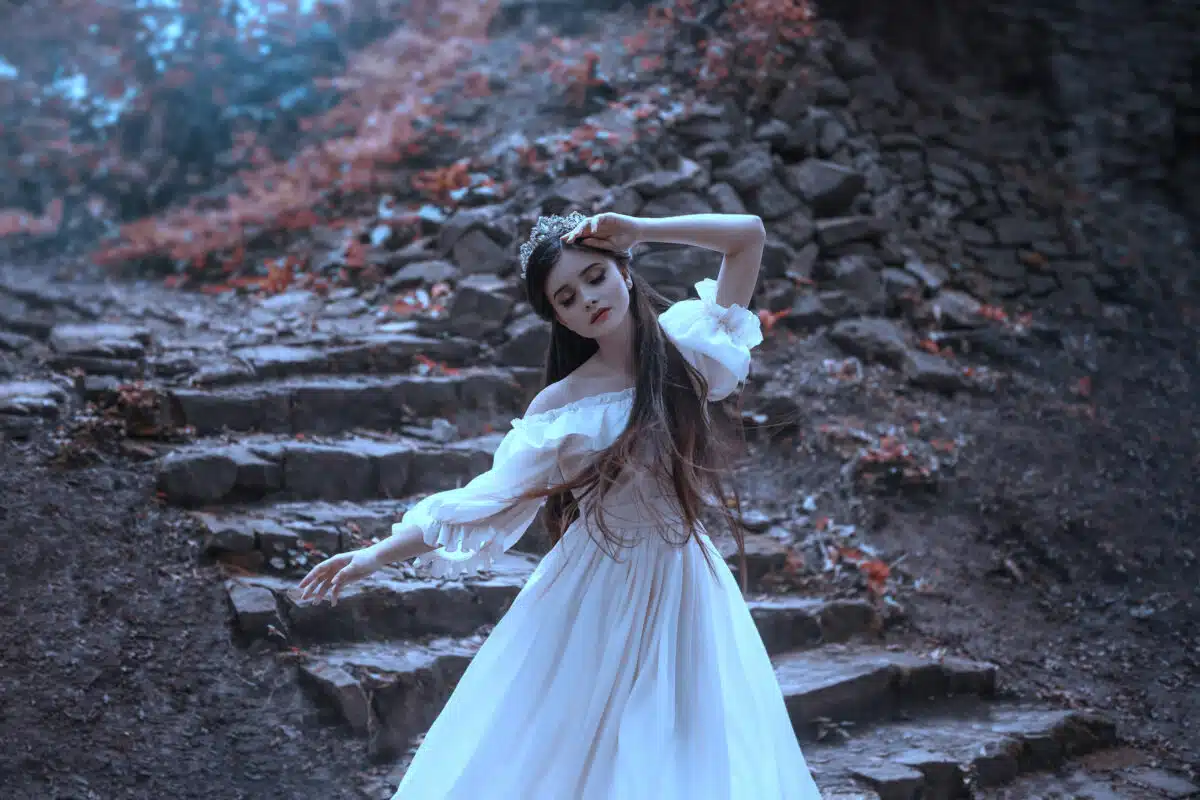
“The Disappointed” by Ella Wheeler Wilcox
There are songs enough for the hero,
Who dwells on the heights of fame :
I sing for the disappointed,
For those who missed their aim.
I sing with a tearful cadence
For one who stands in the dark,
And knows that his last, best arrow
Has bounded back from the mark.
I sing for the breathless runner,
The eager, anxious soul,
Who falls with his strength exhausted
Almost in sight of the goal ;
For the hearts that break in silence
With a sorrow all unknown ;
For those who need companions,
Yet walk their ways alone.
There are songs enough for the lovers
Who share love’s tender pain ;
I sing for the one whose passion
Is given and in vain.
For those whose spirit comrades
Have missed them on the way,
I sing with a heart o’erflowing
This minor strain to-day.
And I know the solar system
Must somewhere keep in space
A prize for that spent runner
Who barely lost the race.
For the Plan would be imperfect
Unless it held some sphere
That paid for the toil and talent
And love that are wasted here.
“Disappointed” by Paul Laurence Dunbar
An old man planted and dug and tended,
Toiling in joy from dew to dew;
The sun was kind, and the rain befriended;
Fine grew his orchard and fair to view.
Then he said: ‘I will quiet my thrifty fears,
For here is fruit for my failing years.’
But even then the storm-clouds gathered,
Swallowing up the azure sky;
The sweeping winds into white foam lathered
The placid breast of the bay, hard by;
Then the spirits that raged in the darkened air
Swept o’er his orchard and left it bare.
The old man stood in the rain, uncaring,
Viewing the place the storm had swept;
And then with a cry from his soul despairing,
He bowed him down to the earth and wept.
But a voice cried aloud from the driving rain;
‘Arise, old man, and plant again!’
“Disappointment” by Mary E. Tucker
Oh, how can I live in a torture so wild,
And yet always be dreaming of bliss?
Why not learn Fate has doomed me to be sorrow’s child,
And in meekness the heavy rod kiss?
I have lived for long months in a bright land of dreams,
Dawning roseate as th’ opening of day;
But alas! the bright tints were but lightning gleams,
Flashing wrath, and then fading away.
The bliss of the soul I have constantly sought,
But alas! I have sought it in vain;
On earth its base semblance is rended and bought,
And I never will seek it again.
How I long for some spot in the solitude deep,
All alone I could dwell there for years;
My only companion, Repentance, and weep
Living fountains of sorrowful tears.
I feel we are drifting too surely apart,
And sadly I think of the pain,
For my loss, which will gnaw the proud core of your heart,
As alone you sail over life’s main.
Oh, why do I sorrow? I know there is rest
For the weary, in mansions above;
And I long to go home to the land of the blest,
And drink deep of God’s pardoning love.

“On Disappointment” by Henry Kirk White
Come, Disappointment, come!
Not in thy terrors clad:
Come, in thy meekest, saddest guise;
Thy chastening rod but terrifies
The restless and the bad.
But I recline
Beneath thy shrine,
And round my brow resign’d thy peaceful cypress twine.
Though Fancy flies away
Before thy hollow tread,
Yet Meditation, in her cell,
Hears with faint eye the lingering knell
That tells her hopes are dead;
And though the tear
By chance appear,
Yet she can smile, and say, My all was not laid here.
Come, Disappointment, come!
Though from Hope’s summit hurl’d,
Still, rigid Nurse, thou art forgiven,
For thou severe wert sent from heaven
To wean me from the world;
To turn my eye
From vanity,
And point to scenes of bliss that never, never die.
What is this passing scene?
A peevish April day!
A little sun—a little rain,
And then night sweeps along the plain.
And all things fade away.
Man (soon discuss’d)
Yields up his trust,
And all his hopes and fears lie with him in the dust.
Oh, what is Beauty’s power?
It flourishes and dies;
Will the cold earth its silence break,
To tell how soft, how smooth a cheek
Beneath its surface lies?
Mute, mute is all
O’er Beauty’s fall;
Her praise resounds no more when mantled in her pall.
The most beloved on earth
Not long survives to-day;
So music past is obsolete,
And yet ’twas sweet, ’twas passing sweet,
But now ’tis gone away.
Thus does the shade
In memory fade,
When in forsaken tomb the form beloved is laid.
Then since this world is vain,
And volatile, and fleet,
Why should I lay up earthly joys,
Where rust corrupts, and moth destroys,
And cares and sorrows eat?
Why fly from ill
With anxious skill,
When soon this hand will freeze, this throbbing heart be still.
Come, Disappointment, come!
Thou art not stern to me;
Sad Monitress! I own thy sway,
A votary sad in early day,
I bend my knee to thee.
From sun to sun
My race will run,
I only bow, and say, My God, thy will be done!
On another paper are a few lines, written probably in the
freshness of his disappointment.
I dream no more—the vision flies away,
And Disappointment….
There fell my hopes—I lost my all in this,
My cherish’d all of visionary bliss.
Now hope farewell, farewell all joys below;
Now welcome sorrow, and now welcome woe.
Plunge me in glooms….
“Penalty” by Ella Wheeler Wilcox
Because of the fullness of what I had
All that I have seems void and vain.
If I had not been happy I were not sad;
Though my salt is savorless, why complain?
From the ripe perfection of what was mine,
All that is mine seems worse than naught;
Yet I know as I sit in the dark and pine,
No cup could be drained which had not been fraught.
From the throb and thrill of a day that was,
The day that now is seems dull with gloom;
Yet I bear its dullness and darkness because
‘Tis but the reaction of glow and bloom.
From the royal feast which of old was spread
I am starved on the diet which now is mine;
Yet I could not turn hungry from water and bread,
If I had not been sated on fruit and wine.
“Poetry and Sorrow” by Charlotte Smith
Should the lone wanderer, fainting on his way,
Rest for a moment of the sultry hours,
And, though his path through thorns and roughness lay,
Pluck the wild rose or woodbine’s gadding flowers;
Weaving gay wreaths beneath some sheltering tree,
The sense of sorrow he awhile may lose:
So have I sought thy flowers, fair Poesy!
So charmed my way with friendship and the Muse.
But darker now grows life’s unhappy day,
Dark with new clouds of evil yet to come;
Her pencil sickening Fancy throws away,
And weary Hope reclines upon the tomb,
And points my wishes to that tranquil shore,
Where the pale spectre, Care, pursues no more!
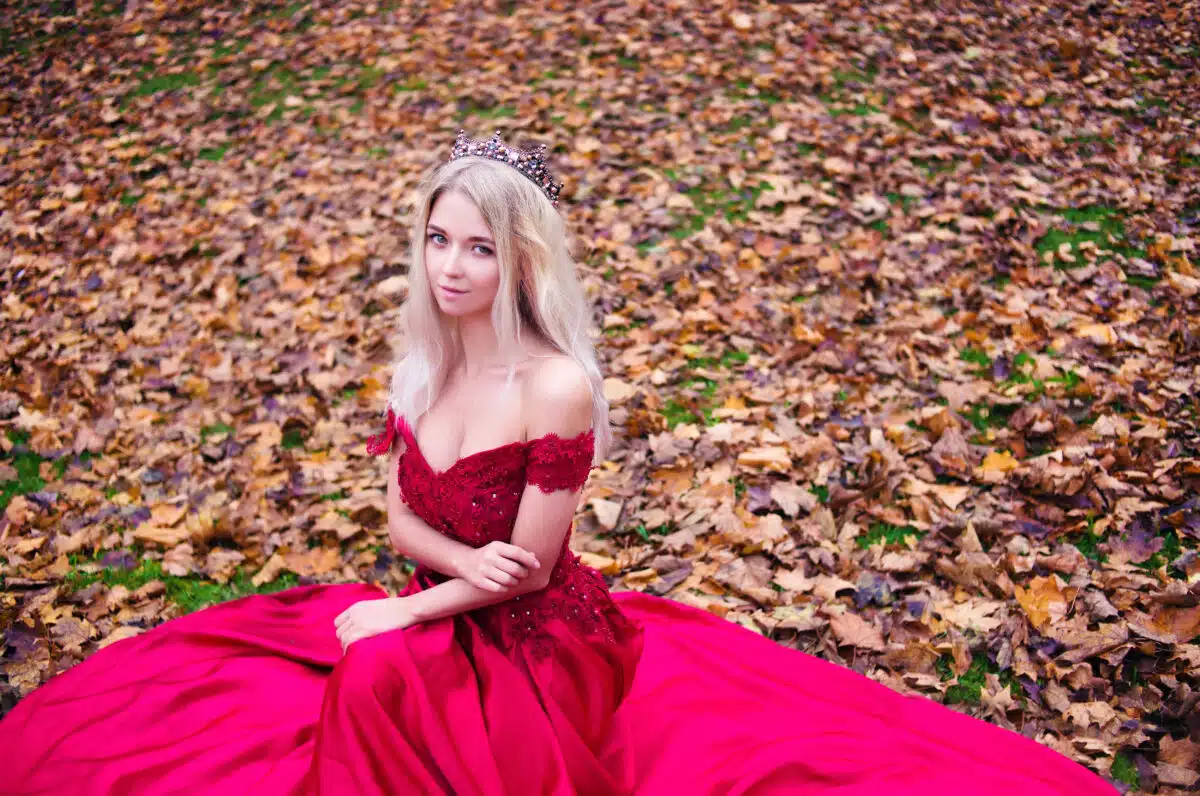
“To A Lady” by Richard Dabney
Lady, that form so slight and fair
Was, surely, never framed to bear
The season’s change, the hand of pain,
And fell disease’s racking train,
That must, from year to year, attend
Life’s course, till life itself shall end.
That heart, so pure, so soft, so good,
That scarce has yet a pang withstood,
Was, surely, never meant to bear
Grief, sorrow, wo, deceit, despair,
And all the mental ills, that rend
The human heart, till life shall end.
Some happy island far removed,
Whose groves of bliss an angel loved,
Where winter’s gloom was never known,
Nor fell disease’s hollow groan;
Where grief, deceit, despair and wo
Dare not their forms of horror show,
Lady, was placed thy destined lot—
But fate, that destiny forgot;
Or, envious of thy blissful state,
Some fiend of earth, and earthly hate
Gave thee to pain and sorrow here—
Betray’d thee to this world of care.
“African Distress” by Theodore Dwight
“Help! oh, help! thou God of Christians!
Save a mother from despair!
Cruel white men steal my children!
God of Christians, hear my prayer!
“From my arms by force they’re rended,
Sailors drag them to the sea;
Yonder ship, at anchor riding,
Swift will carry them away.
“There my son lies, stripp’d, and bleeding;
Fast, with thongs, his hands are bound.
See, the tyrants, how they scourge him!
See his sides a reeking wound
“See his little sister by him;
Quaking, trembling, how she lies!
Drops of blood her face besprinkle;
Tears of anguish fill her eyes.
“Now they tear her brother from her;
Down, below the deck, he’s thrown;
Stiff with beating, through fear silent,
Save a single, death-like, groan.”
Hear the little creature begging!—
“Take me, white men, for your own!
Spare, oh, spare my darling brother!
He ’s my mother’s only son.
“See, upon the shore she’s raving:
Down she falls upon the sands:
Now, she tears her flesh with madness;
Now, she prays with lifted hands.
“I am young, and strong, and hardy;
He ’s a sick, and feeble boy;
Take me, whip me, chain me, starve me,
All my life I ’ll toil with joy.
“Christians! who ’s the God you worship?
Is he cruel, fierce, or good?
Does he take delight in mercy?
Or in spilling human blood?
“Ah, my poor distracted mother!
Hear her scream upon the shore.”—
Down the savage captain struck her,
Lifeless on the vessel’s floor.
Up his sails he quickly hoisted,
To the ocean bent his way;
Headlong plunged the raving mother,
From a high rock, in the sea.
“Failure” by Rupert Brooke
Because God put His adamantine fate
Between my sullen heart and its desire,
I swore that I would burst the Iron Gate,
Rise up, and curse Him on His throne of fire.
Earth shuddered at my crown of blasphemy,
But Love was as a flame about my feet;
Proud up the Golden Stair I strode; and beat
Thrice on the Gate, and entered with a cry —
All the great courts were quiet in the sun,
And full of vacant echoes: moss had grown
Over the glassy pavement, and begun
To creep within the dusty council-halls.
An idle wind blew round an empty throne
And stirred the heavy curtains on the walls.

“The Broken Hearted” by Robert Morris
I would that thou wert dead, devoted one,
For thou art all too pure to linger here;
Life’s joyous sands to thee have fleetly run,
And sorrow’s hand hath made thy being sere—
Thy girlhood was a pure and artless dream,
And many a sunny hope has thrill’d thy breast,
And many an air-blown bubble gilt life’s stream,
Flash’d for a moment—broke, and sunk to rest—
Emblems of youth and loveliness were they,
And like hope’s fairy visions pass’d away.
I would that thou wert dead, forsaken girl,
That high pale brow enshrined within the tomb,
For as with gentle winds still waters curl,
So fades at sorrow’s touch young beauty’s bloom—
Thou art too pure and fair for this cold earth,
A thing too guiltless long to dwell below,
Thy voice has lost its cadences of mirth,
The glory has departed from thy brow—
And youth’s pure bloom has left thy virgin heart,
And beauty like a phantom will depart.
I would that thou wert dead, for life to thee
Is as a broken reed—a wither’d flower;
Dark shadows rest upon thy destiny,
And storms of fate around thy fortunes lower—
Wedded to one thy bosom cannot love,
Banish’d from him thine every thought employs,
Thou art in heart a bruised and wounded dove,
And earth to thee can yield no future joys,
Wearily passes life and time with thee,
A dusky shadow dims thy destiny.
I would that thou wert dead, devoted one,
And thy bright spirit disenthrall’d of clay;
Even as the dew-drop wastes beneath the sun,
Thus by disease thy being wastes away—
Oh, who that knew thee when thou wert a child,
With a glad voice and heaven unfolding eye,
A creature as the snow flake undefiled,
With a bright lip and cheek of rosy dye,
Oh, who that knew thee then, can see thee now,
Nor wonder for the beauty of thy brow.
I would that thou wert dead, and sanctified—
Thy spirit with high element is fraught,
And that which scorn and cruelty defied,
The lingering stealth of pale disease has wrought—
Yes, death is near thee now, sweet Genevieve,
And thou shalt haste to meet him with a smile;
It is in vain thy gentle sisters grieve,
Thy soul shall soon flee by each starry isle,
That glitters brightly through the calm blue skies,
Like white lids lifted from pure spirit’s eyes.
Thou soon shalt die, sweet martyr, and the earth
Will nurture gentle flowers above thy grave,
Sweet emblems of thy being and thy birth,
With cypress leaves around thy tomb shall wave—
And when the pensive stranger wanders nigh,
His lips shall waft a tributary prayer,
For her who soon shall prematurely die,
For her whose seraph form shall moulder there—
Farewell, sweet Genevieve—’t is sad to part—
Farewell, thy beauty shrouds a breaking heart.
“Henry Tripp” by Edgar Lee Masters
The bank broke and I lost my savings.
I was sick of the tiresome game in Spoon River
And I made up my mind to run away
And leave my place in life and my family;
But just as the midnight train pulled in,
Quick off the steps jumped Cully Green
And Martin Vise, and began to fight
To settle their ancient rivalry,
Striking each other with fists that sounded
Like the blows of knotted clubs.
Now it seemed to me that Cully was winning,
When his bloody face broke into a grin
Of sickly cowardice, leaning on Martin
And whining out “We’re good friends, Mart,
You know that I’m your friend.”
But a terrible punch from Martin knocked him
Around and around and into a heap.
And then they arrested me as a witness,
And I lost my train and staid in Spoon River
To wage my battle of life to the end.
Oh, Cully Green, you were my savior —
You, so ashamed and drooped for years,
Loitering listless about the streets,
And tying rags ’round your festering soul,
Who failed to fight it out.
“Composed By The Seashore” by William Wordsworth
What mischief cleaves to unsubdued regret,
How fancy sickens by vague hopes beset;
How baffled projects on the spirit prey,
And fruitless wishes eat the heart away,
The Sailor knows; he best, whose lot is cast
On the relentless sea that holds him fast
On chance dependent, and the fickle star
Of power, through long and melancholy war.
O sad it is, in sight of foreign shores,
Daily to think on old familiar doors,
Hearths loved in childhood, and ancestral floors;
Or, tossed about along a waste of foam,
To ruminate on that delightful home
Which with the dear Betrothed ‘was’ to come;
Or came and was and is, yet meets the eye
Never but in the world of memory;
Or in a dream recalled, whose smoothest range
Is crossed by knowledge, or by dread, of change,
And if not so, whose perfect joy makes sleep
A thing too bright for breathing man to keep.
Hail to the virtues which that perilous life
Extracts from Nature’s elemental strife;
And welcome glory won in battles fought
As bravely as the foe was keenly sought.
But to each gallant Captain and his crew
A less imperious sympathy is due,
Such as my verse now yields, while moonbeams play
On the mute sea in this unruffled bay;
Such as will promptly flow from every breast,
Where good men, disappointed in the quest
Of wealth and power and honours, long for rest;
Or, having known the splendours of success,
Sigh for the obscurities of happiness.

“Sadness” by William Saphier
It is a huge curtain,
stretched at a distance around me.
Aimless gypsies crawl up and over the curtain.
They are my days.
They neither sing nor laugh
but hop over the top of my sadness.
Here and there one wears a gay shirt.
He is faster than the rest.
Even in my sleep with closed eyes
I cannot pierce this drapery.
Some day I will wind a child’s smile around my face
and thus disguised
Slip through the curtain and jump…
Where?
Ah, yes, where?
“That too much Confidence sometimes disappointeth Hope” by Sir Thomas Wyatt
My hope, alas! hath me abused,
And vain rejoicing hath me fed:
Lust and joy have me refused,
And careful plaint is in their stead;
Too much advancing slack’d my speed,
Mirth hath caused my heaviness,
And I remain all comfortless.
Whereto did I assure my thought
Without displeasure steadfastly;
In Fortune’s forge my joy was wrought,
And is revolted readily.
I am mistaken wonderly;
For I thought nought but faithfulness;
Yet I remain all comfortless.
In gladsome cheer I did delight,
Till that delight did cause my smart,
And all was wrong when I thought right;
For right it was, that my true heart
Should not from Truth be set apart,
Since Truth did cause my hardiness;
Yet I remain all comfortless.
Sometime delight did tune my song,
And led my heart full pleasantly;
And to myself I said among—
‘My hap is coming hastily.’
But it hath happed contrary.
Assurance causeth my distress,
And I remain all comfortless.
Then if my note now do vary,
And leave his wonted pleasantness;
The heavy burthen that I carry
Hath alter’d all my joyfulness.
No pleasure hath still steadfastness,
But haste hath hurt my happiness;
And I remain all comfortless.
“There’s A Regret” by William Ernest Henley
There’s a regret
So grinding, so immitigably sad,
Remorse thereby feels tolerant, even glad . . .
Do you not know it yet?
For deeds undone
Rankle and snarl and hunger for their due,
Till there seems naught so despicable as you
In all the grin o’ the sun.
Like an old shoe
The sea spurns and the land abhors, you lie
About the beach of Time, till by and by
Death, that derides you too—
Death, as he goes
His ragman’s round, espies you, where you stray,
With half-an-eye, and kicks you out of his way;
And then—and then, who knows
But the kind Grave
Turns on you, and you feel the convict Worm,
In that black bridewell working out his term,
Hanker and grope and crave?
‘Poor fool that might—
That might, yet would not, dared not, let this be,
Think of it, here and thus made over to me
In the implacable night!’
And writhing, fain
And like a triumphing lover, he shall take
His fill where no high memory lives to make
His obscene victory vain.

“Why Should I Wander Sadly?” by Susskind von Trimberg
Why should I wander sadly,
My harp within my hand,
O’er mountain, hill, and valley?
What praise do I command?
Full well they know the singer
Belongs to race accursed;
Sweet Minne doth no longer
Reward me as at first.
Be silent, then, my lyre,
We sing ’fore lords in vain,
I’ll leave the minstrels’ choir,
And roam a Jew again.
My staff and hat I’ll grasp, then,
And on my breast full low,
By Jewish custom olden
My grizzled beard shall grow.
My days I’ll pass in quiet,—
Those left to me on earth—
Nor sing for those who not yet
Have learned a poet’s worth.
“A Ballad of Burdens” by Algernon Charles Swinburne
The burden of fair women. Vain delight,
And love self-slain in some sweet shameful way,
And sorrowful old age that comes by night
As a thief comes that has no heart by day,
And change that finds fair cheeks and leaves them grey,
And weariness that keeps awake for hire,
And grief that says what pleasure used to say;
This is the end of every man’s desire.
The burden of bought kisses. This is sore,
A burden without fruit in childbearing;
Between the nightfall and the dawn threescore,
Threescore between the dawn and evening.
The shuddering in thy lips, the shuddering
In thy sad eyelids tremulous like fire,
Makes love seem shameful and a wretched thing,
This is the end of every man’s desire.
The burden of sweet speeches. Nay, kneel down,
Cover thy head, and weep; for verily
These market-men that buy thy white and brown
In the last days shall take no thought for thee.
In the last days like earth thy face shall be,
Yea, like sea-marsh made thick with brine and mire,
Sad with sick leavings of the sterile sea.
This is the end of every man’s desire.
The burden of long living. Thou shalt fear
Waking, and sleeping mourn upon thy bed;
And say at night “Would God the day were here,”
And say at dawn “Would God the day were dead.”
With weary days thou shalt be clothed and fed,
And wear remorse of heart for thine attire,
Pain for thy girdle and sorrow upon thine head;
This is the end of every man’s desire.
The burden of bright colours. Thou shalt see
Gold tarnished, and the grey above the green;
And as the thing thou seest thy face shall be,
And no more as the thing beforetime seen.
And thou shalt say of mercy “It hath been,”
And living, watch the old lips and loves expire,
And talking, tears shall take thy breath between;
This is the end of every man’s desire.
The burden of sad sayings. In that day
Thou shalt tell all thy days and hours, and tell
Thy times and ways and words of love, and say
How one was dear and one desirable,
And sweet was life to hear and sweet to smell,
But now with lights reverse the old hours retire
And the last hour is shod with fire from hell;
This is the end of every man’s desire.
The burden of four seasons. Rain in spring,
White rain and wind among the tender trees;
A summer of green sorrows gathering,
Rank autumn in a mist of miseries,
With sad face set towards the year, that sees
The charred ash drop out of the dropping pyre,
And winter wan with many maladies;
This is the end of every man’s desire.
The burden of dead faces. Out of sight
And out of love, beyond the reach of hands,
Changed in the changing of the dark and light,
They walk and weep about the barren lands
Where no seed is nor any garner stands,
Where in short breaths the doubtful days respire,
And time’s turned glass lets through the sighing sands;
This is the end of every man’s desire.
The burden of much gladness. Life and lust
Forsake thee, and the face of thy delight;
And underfoot the heavy hour strews dust,
And overhead strange weathers burn and bite;
And where the red was, lo the bloodless white,
And where truth was, the likeness of a liar,
And where day was, the likeness of the night;
This is the end of every man’s desire.
L’ENVOY
Princes, and ye whom pleasure quickeneth,
Heed well this rhyme before your pleasure tire;
For life is sweet, but after life is death.
This is the end of every man’s desire.
“Repentance” by Ameen Rihani
When tears wash tears and soul upon soul leaps,
When clasped in arms of anguish and of pain,
When love beneath the feet of passion creeps,
Ah me, what do we gain?
When we our rosy bower to demons lease,
When Life’s most tender strains by shrieks are slain,
When strife invades our quietude and peace,
Ah me, what do we gain?
When we allow the herbs of hate to sprout,
When weeds of jealousy the lily stain,
When pearls of faith are crushed by stones of doubt,
Ah me, what do we gain?
When night creeps on us in the light of day,
When we nepenthes of good cheer disdain,
When on the throne of courage sits dismay,
Ah me, what do we gain?
When sweetness, goodness, kindness all have died,
When naught but broken, bleeding hearts remain,
When rough- shod o’er our better self we ride,
Ah me, what do we gain?
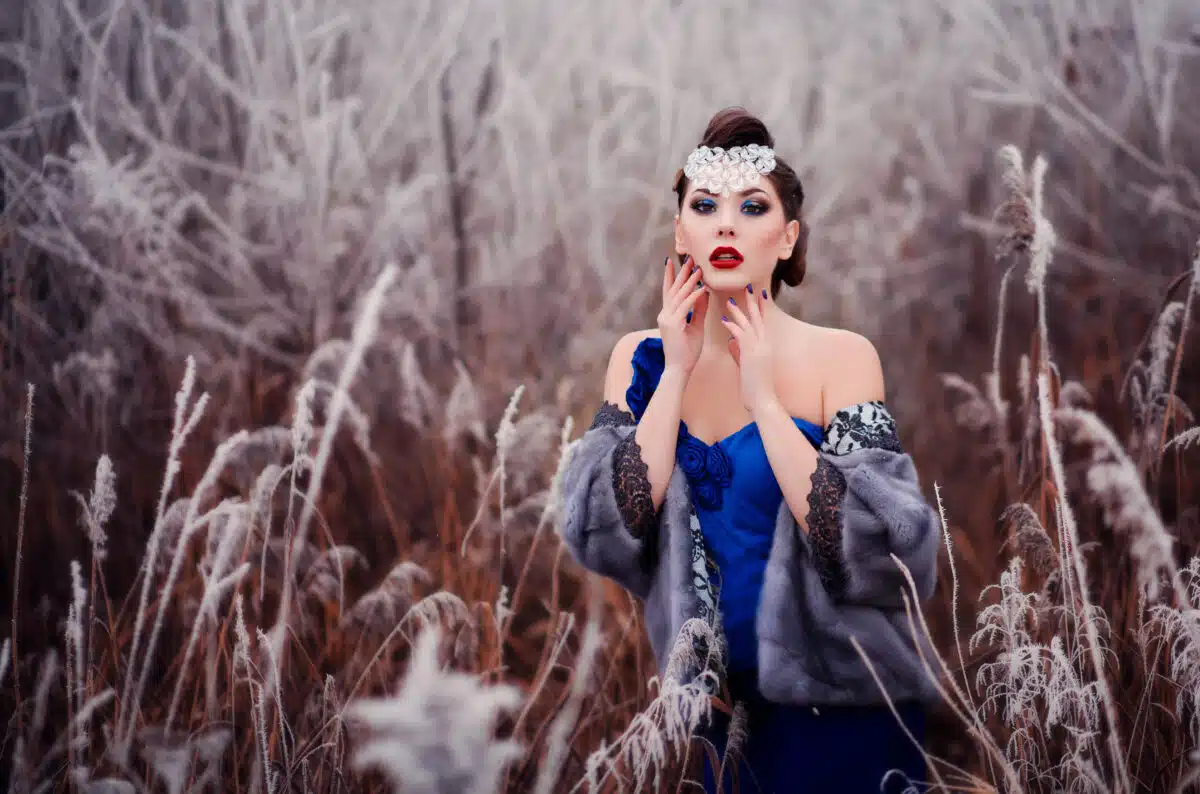
“Sonnet” by Rachel Morpurgo
My soul surcharged with grief now loud complains,
And fears upon my spirit heavily weigh,
“Thy poem we have heard,” the people say,
“Who like to thee can sing melodious strains?”
“They’re naught but sparks,” outspeaks my soul in chains,
“Struck from my life by torture every day.
But now all perfume’s fled—no more my lay
Shall rise; for, fear of shame my song restrains.”
A woman’s fancies lightly roam, and weave
Themselves into a fairy web. Should I
Refrain? Ah! soon enough this pleasure, too,
Will flee! Verily I cannot conceive
Why I’m extolled. For woman ’tis to ply
The spinning wheel—then to herself she’s true.
“Disillusion” by John Le Gay Brereton
When fires have burnt your forest bare and black,
And you are parched and dizzy, and search in vain
For pools in dust unvisited of rain,
And shamble, lost, along a shimmering track,
This is the comfort of the world: “Alack!
So youth’s illusions die, that we may gain
Wisdom and strength to face our lifelong pain,
The truth, from which no man shall turn him back.”
Falter for no such melancholy lies,
For by one holy touch the spirit is healed
To know its treasure of sight and sound and scent;
Veil after veil the earthborn fogs arise,
Star beyond star the heavens are then revealed,
And truth is fair in love’s enlightenment.
“Disillusion” by Victor James Daley
For some forty years, and over,
Poets had with me their way;
And they made me think that Sorrow
Owned the Night and owned the Day;
And the corpse beneath the clover
Had a hopeful word to say.
And they made me think that Sorrow
Was the Shadow in the Sun;
And they made me think To-morrow
Was a gift to everyone:
And the days I used to borrow,
Till my credit now is done.
And they told me softly, sweetly,
That, when Life had lost its glee,
I could be consoled completely
By the Forest or the Sea;
And they wrote their rhymes so neatly
That they quite deluded me.
But when Sorrow is at sorest,
And the heart weeps silently,
Is there healing in the Forest?
Is there solace in the Sea?
And the God whom thou adorest
Has He any help for thee?
Does it soothe the spent man dying
That the stars are shining bright
O’er the field where he is lying?
And the moon, with all her light,
Does she help his bare soul flying
Through the vast and lonely Night?
Give to me the grasp of true man,
Though his state be high or low,
Give to me the kiss of woman,
Let your Seas and Forests go:
There is nothing but the human
Touch can heal the human woe.
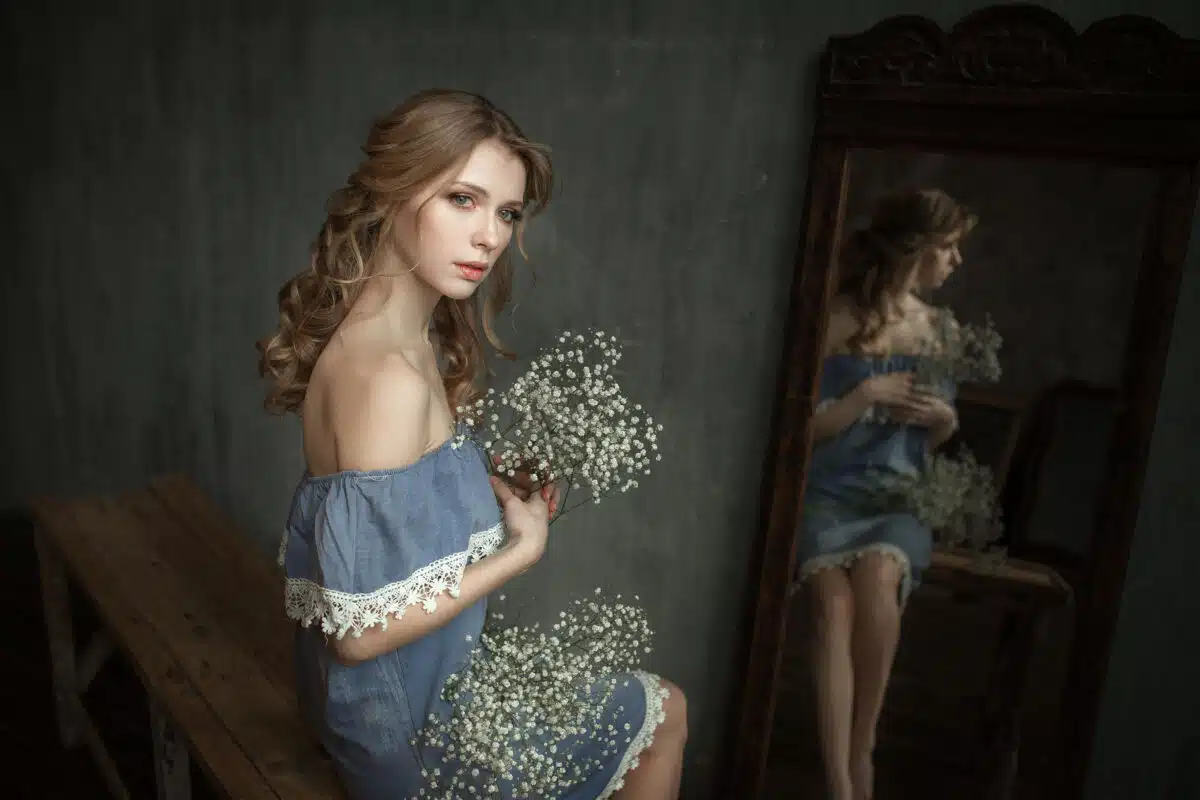
“The Eyes of My Regret” by Angelina Weld Grimké
Always at dusk, the same tearless experience,
The same dragging of feet up the same well-worn path
To the same well-worn rock;
The same crimson or gold dropping away of the sun
The same tints, – rose, saffron, violet, lavender, grey
Meeting, mingling, mixing mistily;
Before me the same blue black cedar rising jaggedly to
a point;
Over it, the same slow unlidding of twin stars,
Two eyes, unfathomable, soul-searing,
Watching, watching, watching me;
The same two eyes that draw me forth, against my will
dusk after dusk;
The same two eyes that keep me sitting late into the
night, chin on knees
Keep me there lonely, rigid, tearless, numbly
miserable –
The eyes of my Regret.
“Disillusioned By An Ex-Enthusiast” by William Schwenck Gilbert
Oh, that my soul its gods could see
As years ago they seemed to me
When first I painted them;
Invested with the circumstance
Of old conventional romance:
Exploded theorem!
The bard who could, all men above,
Inflame my soul with songs of love,
And, with his verse, inspire
The craven soul who feared to die
With all the glow of chivalry
And old heroic fire;
I found him in a beerhouse tap
Awaking from a gin-born nap,
With pipe and sloven dress;
Amusing chums, who fooled his bent,
With muddy, maudlin sentiment,
And tipsy foolishness!
The novelist, whose painting pen
To legions of fictitious men
A real existence lends,
Brain-people whom we rarely fail,
Whene’er we hear their names, to hail
As old and welcome friends;
I found in clumsy snuffy suit,
In seedy glove, and blucher boot,
Uncomfortably big.
Particularly commonplace,
With vulgar, coarse, stockbroking face,
And spectacles and wig.
My favourite actor who, at will,
With mimic woe my eyes could fill
With unaccustomed brine:
A being who appeared to me
(Before I knew him well) to be
A song incarnadine;
I found a coarse unpleasant man
With speckled chin – unhealthy, wan –
Of self-importance full:
Existing in an atmosphere
That reeked of gin and pipes and beer –
Conceited, fractious, dull.
The warrior whose ennobled name
Is woven with his country’s fame,
Triumphant over all,
I found weak, palsied, bloated, blear;
His province seemed to be, to leer
At bonnets in Pall Mall.
Would that ye always shone, who write,
Bathed in your own innate limelight,
And ye who battles wage,
Or that in darkness I had died
Before my soul had ever sighed
To see you off the stage!
Oh, that my soul its gods could see
As years ago they seemed to me
When first I painted them;
Invested with the circumstance
Of old conventional romance:
Exploded theorem!
The bard who could, all men above,
Inflame my soul with songs of love,
And, with his verse, inspire
The craven soul who feared to die
With all the glow of chivalry
And old heroic fire;
I found him in a beerhouse tap
Awaking from a gin-born nap,
With pipe and sloven dress;
Amusing chums, who fooled his bent,
With muddy, maudlin sentiment,
And tipsy foolishness!
The novelist, whose painting pen
To legions of fictitious men
A real existence lends,
Brain-people whom we rarely fail,
Whene’er we hear their names, to hail
As old and welcome friends;
I found in clumsy snuffy suit,
In seedy glove, and blucher boot,
Uncomfortably big.
Particularly commonplace,
With vulgar, coarse, stockbroking face,
And spectacles and wig.
My favourite actor who, at will,
With mimic woe my eyes could fill
With unaccustomed brine:
A being who appeared to me
(Before I knew him well) to be
A song incarnadine;
I found a coarse unpleasant man
With speckled chin – unhealthy, wan –
Of self-importance full:
Existing in an atmosphere
That reeked of gin and pipes and beer –
Conceited, fractious, dull.
The warrior whose ennobled name
Is woven with his country’s fame,
Triumphant over all,
I found weak, palsied, bloated, blear;
His province seemed to be, to leer
At bonnets in Pall Mall.
Would that ye always shone, who write,
Bathed in your own innate limelight,
And ye who battles wage,
Or that in darkness I had died
Before my soul had ever sighed
To see you off the stage!
“Disenchantment” by Arthur Macy
Time and I have fallen out;
We, who were such steadfast friends.
So slowly has it come about
That none may tell when it began;
Yet sure am I a cunning plan
Runs through it all;
And now, beyond recall,
Our friendship ends,
And ending, there remains to me
The memory of disloyalty.
Long years ago Time tripping came
With promise grand,
And sweet assurances of fame;
And hand in hand
Through fairy-land
Went he and I together
In bright and golden weather.
Then, then I had not learned to doubt,
For friends were gods, and faith was sure,
And words were truth, and deeds were pure,
Before we had our falling out;
And life, all hope, was fair to see,
When Time made promise sweet to me.
When first my faithless friend grew cold
I sought to knit a closer bond,
But he, less fond,
Sad days and years upon me rolled,
Pressed me with care,
With envy tinged the boyhood hair,
And ploughed unwelcome furrows in
Where none had been.
In vain I begged with trembling lip
For our old sweet companionship,
And saw, ‘mid prayers and tears devout,
The presage of our falling out.
And now I know Time has no friends,
Nor pity lends,
But touches all
With heavy finger soon or late;
And as we wait
The Reaper’s call,
The sickle’s fatal sweep,
We strive in vain to keep
One truth inviolate,
One cherished fancy free from doubt.
It was not so
Long years ago,
Before we had our falling out.
If Time would come again to me,
And once more take me by the hand
For golden walks through fairy-land,
I could forgive the treachery
That stole my youth
And what of truth
Was mine to know;
Nor would I more his love misdoubt;
And I would throw
My arms around him so,
That he’d forgive the falling out!
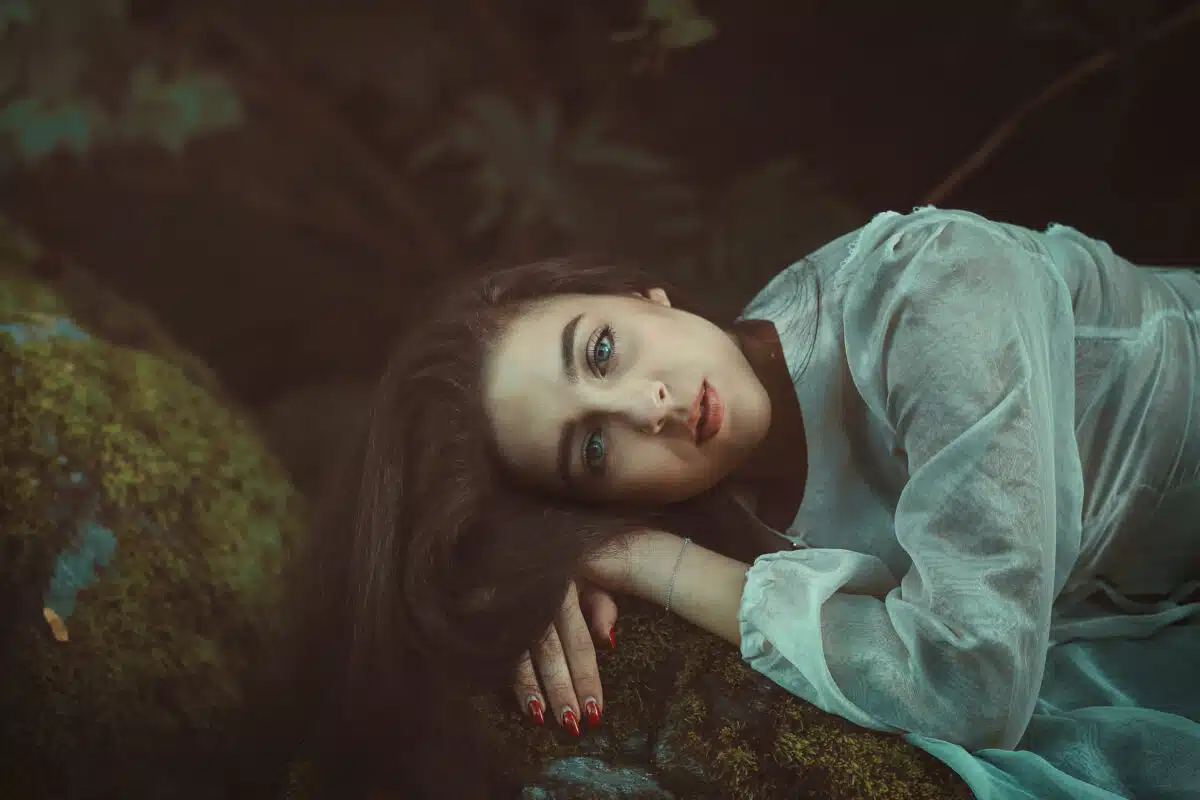
“The Saddest Thought” by W. M. MacKeracher
Sad is the wane of beauty to the fair,
Sad is the flux of fortune to the proud,
Sad is the look dejected lovers wear,
And sad is worth beneath detraction’s cloud.
Sad is our youth’s inexorable end,
Sad is the bankruptcy of fancy’s wealth,
Sad is the last departure of a friend,
And sadder than most things is loss of health.
And yet more sad than these to think upon
Is this – the saddest thought beneath the sun –
Life, flowing like a river, almost gone
Into eternity, and nothing done.
Let me be spared that bootless last regret:
Let me work now; I may do something yet.
“The Sad Man” by Alfred Lichtenstein
No, I have no capacity for life.
I could be considered foolish –
Today I am not going to the restaurant.
I am after all this time weary of the waiters,
Who scornfully bring us, with their smug grimaces,
Dark beer and make us so confused
That we cannot find our home
And we must
Use the foolish street lights
To prop ourselves up
with weak hands.
Today I have bigger things in mind –
Ah, I shall find out the meaning of existence.
And in the evening I shall do some roller skating
Or go at some point to Temple.
“Regret” by Victor-Marie Hugo
Yes, Happiness hath left me soon behind!
Alas! we all pursue its steps! and when
We’ve sunk to rest within its arms entwined,
Like the Phoenician virgin, wake, and find
Ourselves alone again.
Then, through the distant future’s boundless space,
We seek the lost companion of our days:
‘Return, return!’ we cry, and lo, apace
Pleasure appears! but not to fill the place
Of that we mourn always.
I, should unhallowed Pleasure woo me now,
Will to the wanton sorc’ress say, ‘Begone!
Respect the cypress on my mournful brow,
Lost Happiness hath left regret–but thou
Leavest remorse, alone.’
Yet, haply lest I check the mounting fire,
O friends, that in your revelry appears!
With you I’ll breathe the air which ye respire,
And, smiling, hide my melancholy lyre
When it is wet with tears.
Each in his secret heart perchance doth own
Some fond regret ‘neath passing smiles concealed;–
Sufferers alike together and alone
Are we; with many a grief to others known,
How many unrevealed!
Alas! for natural tears and simple pains,
For tender recollections, cherished long,
For guileless griefs, which no compunction stains,
We blush; as if we wore these earthly chains
Only for sport and song!
Yes, my blest hours have fled without a trace:
In vain I strove their parting to delay;
Brightly they beamed, then left a cheerless space,
Like an o’erclouded smile, that in the face
Lightens, and fades away.

“The Woman of Sorrows” by Ernest Rhys
To bed I went for rest, no rest there to find:
Day might sleep, nor I; midnight waked my mind.
Oh a heavy wall has sorrow, a gloomy hedge has care:
They kept me close, kept me fast; held and bound me there.
The wind in the keyhole, it whimpered bitterly,
And I got up to open to my crying baby.
I’m not ashamed to cry myself, but I’m too proud to pray
To have the only things I’ve left rolled up and put away.
That was a babeless woman—Helen of Troy:
She never knew the sorrow, and never half the joy.
I pity the poor women that childing never knew,
And the nestling of the babe, that crying hungry grew.
Would you take from my bosom the feeling of my child?
As soon take the curlew, crying from the wild.
Oh my sorrow for my babe is become my baby.
The one they have taken, the other cannot be.
When you see the dog cast for the ewe in the snow;
When you watch the mother-thrush, with her nest broke below;
Or look in the eyes of the dead that cannot look,
You may think of my baby and the breast it forsook.
“Regret” by Jean Ingelow
O that word REGRET!
There have been nights and morns when we have sighed,
“Let us alone, Regret! We are content
To throw thee all our past, so thou wilt sleep
For aye.” But it is patient, and it wakes;
It hath not learned to cry itself to sleep,
But plaineth on the bed that it is hard.
We did amiss when we did wish it gone
And over: sorrows humanize our race;
Tears are the showers that fertilize this world;
And memory of things precious keepeth warm
The heart that once did hold them. They are poor
That have lost nothing; they are poorer far
Who, losing, have forgotten; they most poor
Of all, who lose and wish they MIGHT forget.
For life is one, and in its warp and woof
There runs a thread of gold that glitters fair,
And sometimes in the pattern shows most sweet
Where there are sombre colors. It is true
That we have wept. But O! this thread of gold,
We dould not have it tarnish; let us turn
Oft and look back upon the wondrous web,
And when it shineth sometimes we shall know
That memory is possession.
I
When I remember something which I had,
But which is gone, and I must do without,
I sometimes wonder how I can be glad,
Even in cowslip time when hedges sprout;
It makes me sigh to think on it,–but yet
My days will not be better days, should I forget.
II
When I remember something promised me,
But which I never had, nor can have now,
Because the promiser we no more see
In countries that accord with mortal vow;
When I remember this, I mourn,–but yet
My happier days are not the days when I forget.
“Sorrow Song” by Percy Bysshe Shelley
To me this world’s a dreary blank,
All hopes in life are gone and fled,
My high strung energies are sank,
And all my blissful hopes lie dead.—
The world once smiling to my view,
Showed scenes of endless bliss and joy;
The world I then but little knew,
Ah! little knew how pleasures cloy;
All then was jocund, all was gay,
No thought beyond the present hour,
I danced in pleasure’s fading ray,
Fading alas! as drooping flower.
Nor do the heedless in the throng,
One thought beyond the morrow give[,]
They court the feast, the dance, the song,
Nor think how short their time to live.
The heart that bears deep sorrow’s trace,
What earthly comfort can console,
It drags a dull and lengthened pace,
‘Till friendly death its woes enroll.—
The sunken cheek, the humid eyes,
E’en better than the tongue can tell;
In whose sad breast deep sorrow lies,
Where memory’s rankling traces dwell.—
The rising tear, the stifled sigh,
A mind but ill at ease display,
Like blackening clouds in stormy sky,
Where fiercely vivid lightnings play.
Thus when souls’ energy is dead,
When sorrow dims each earthly view,
When every fairy hope is fled,
We bid ungrateful world adieu.
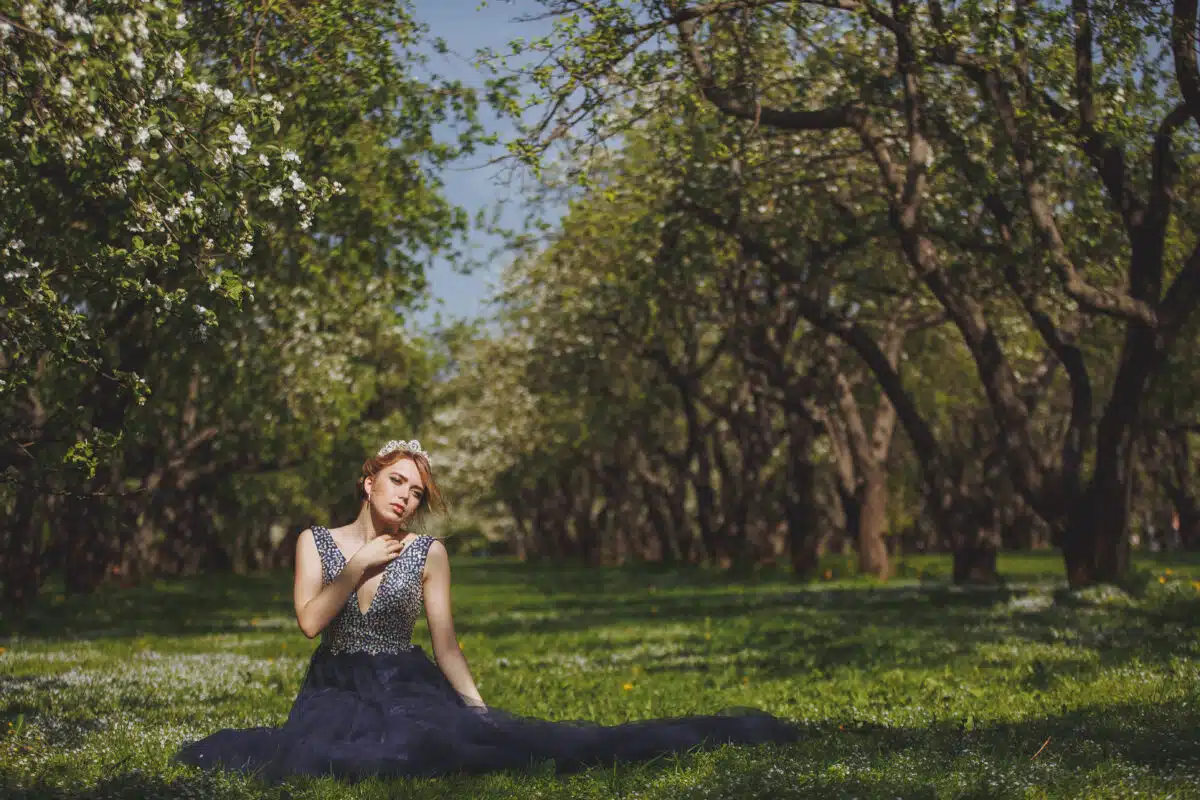
“Regret” by Ella Wheeler Wilcox
There is a haunting phantom called Regret,
A shadowy creature robed somewhat like Woe,
But fairer in the face, whom all men know
By her sad mien and eyes forever wet.
No heart would seek her; but once having met,
All take her by the hand, and to and fro
They wander through those paths of long ago—
Those hallowed ways ’twere wiser to forget.
One day she led me to that lost land’s gate
And bade me enter; but I answered “No!
I will pass on with my bold comrade, Fate;
I have no tears to waste on thee—no time;
My strength I hoard for heights I hope to climb:
No friend art thou for souls that would be great.”
“Despondency” by Anne Bronte
I have gone backward in the work,
The labour has not sped,
Drowsy and dark my spirit lies,
Heavy and dull as lead.
How can I rouse my sinking soul
From such a lethargy?
How can I break these iron chains,
And set my spirit free?
There have been times when I have mourned,
In anguish o’er the past;
And raised my suppliant hands on high,
While tears fell thick and fast,
And prayed to have my sins forgiven
With such a fervent zeal,
An earnest grief — a strong desire
That now I cannot feel!
And vowed to trample on my sins,
And called on Heaven to aid
My spirit in her firm resolves
And hear the vows I made.
And I have felt so full of love,
So strong in spirit then,
As if my heart would never cool
Or wander back again.
And yet, alas! how many times
My feet have gone astray,
How oft have I forgot my God,
How greatly fallen away!
My sins increase, my love grows cold,
And Hope within me dies,
And Faith itself is wavering now,
O how shall I arise!
I cannot weep but I can pray,
Then let me not despair;
Lord Jesus, save me lest I die,
And hear a wretch’s prayer.
“Despondency” by Archibald Lampman
Slow figures in some live remorseless frieze,
The approaching days escapeless and unguessed,
With mask and shroud impenetrably dressed;
Time, whose inexorable destinies
Bear down upon us like impending seas;
And the huge presence of the world, at best
A sightless giant wandering without rest,
Aged and mad with many miseries.
The weight and measure of these things who knows?
Resting at times beside life’s thought-swept stream,
Sobered and stunned with unexpected blows,
We scarcely hear the uproar; life doth seem,
Save for the certain nearness of its woes,
Vain and phantasmal as a sick man’s dream.
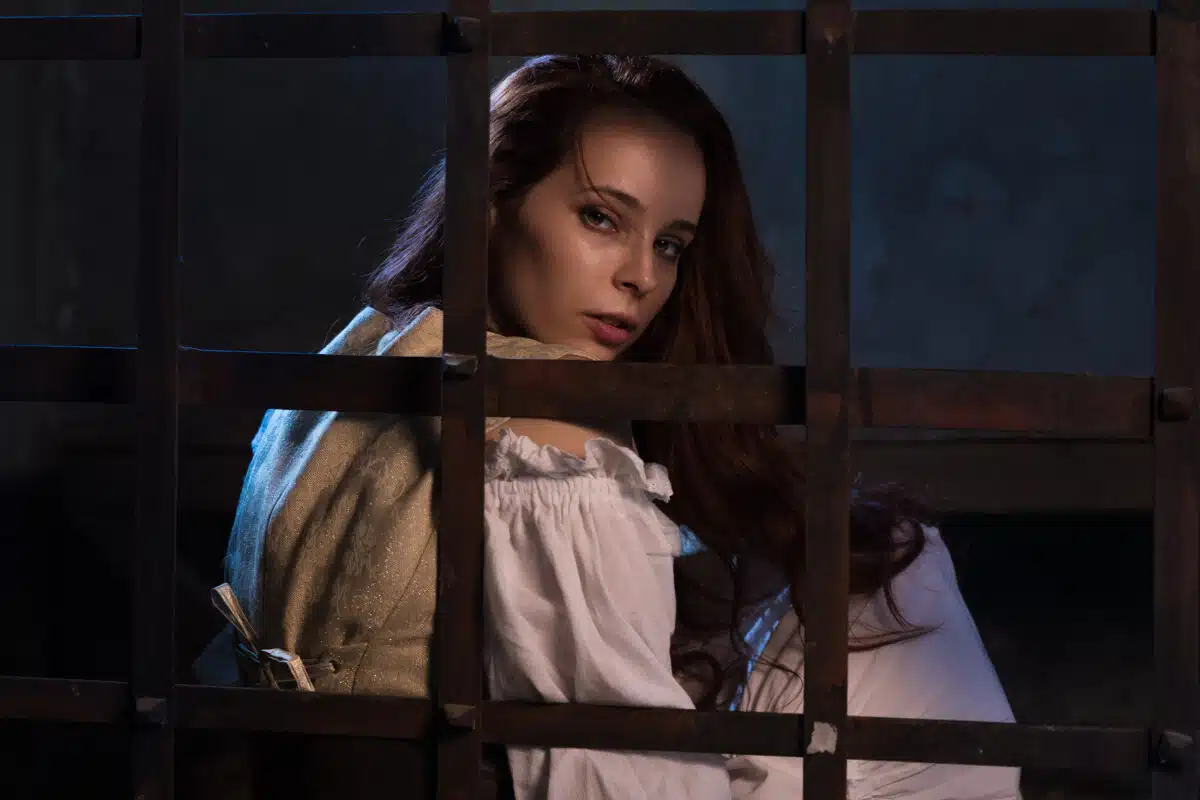
“Depression” by Morris Rosenfeld
All the striving, all the failing,
To the silent Nothing sailing.
Swiftly, swiftly passing by!
For the land of shadows leaving,
Where a wistful hand is weaving
Thy still woof, Eternity!
Gloomy thoughts in me awaken,
And with fear my breast is shaken,
Thinking: O thou black abyss;
All the toil and thrift of life,
All the struggle and the strife,
Shall it come at last to this?
With the grave shall be requited
Good and evil, and united
Ne’er to separate again?
What the light hath parted purely,
Shall the darkness join more surely?-
Was the vict’ry won in vain?
O mute and infinite extension,
O time beyond our comprehension,
Shall thought and deed ungarnered fall?
Ev’rything dost take and slay,
Ev’rything dost bear away,
Silent Nothing, silent All!…
“Despondency” by Freeman Edwin Miller
O, gloomy world that rolls in weary space,
And moans wild music to the broken spheres,
Whose rivers wander into seas of tears,
Despair has bound thee in a close embrace;
A birth, a life, a death; man is no more!
Death grows beside existence, and with time
Is comrade of its changes; cycles roll
Their heavy circles through the human soul,
And pour their dirges into mournful rhyme;
A birth, a life, a death; man is no more!
He gropes in shadows for a happy beam
That shall delight his bosom; into mist
Dissolves the substance that ambition kissed,
While greatness grows the garland of a dream;
A birth, a life, a death; man is no more!
Endeavor struggles to an open grave;
The past is lost in monumental dust,
Where age on age in angry ire has thrust
The wise, the strong, the mighty, and the brave;
A birth, a life, a death; man is no more!
The years are shades that totter from their tombs,
The ages, ghosts that live in catacombs
And lure the Present to their awful homes,
Where ancient races wander in the glooms;
A birth, a life, a death; man is no more!
Oblivion welcomes men with gentle arms,
And presses them like infants to her breast,
Repeats to them her lullabies of rest,
And guards them from all sorrows and alarms;
A birth, a life, a death; man is no more!
Then hasten, world, and let my battle cease;
I care not where I stay nor when I go;
For action gives unhappiness and woe,
But Lethe brings forgetfulness and peace;
A birth, a life, a death; man is no more!
“Despondency” by Wilfred S. Skeats
You have said that there is not a fear
Or a doubt that oppresses your soul,
That your faith is so strong
That it bears you along,
Ever holding you in its control.
‘Tis a comfort to know there is one
Whose allegiance cannot be denied,
But I fain would enquire,
(For your faith is far high’r
Than is mine): Have you ever been tried?
Have you sought to aspire to a life
Higher far than the one that is past?
Have you laboured through years,
By your hopes crushing fears,
But to meet disappointment at last?
Have the friends who should love you the best,
In your absence forgotten that love,
And refused to impart
To your grief-stricken heart
All the solace their kindness would prove?
Has the world misconstrued your intents,
And endeavoured to sully your fame?
Has the venomous tongue
With its calumny stung
Your proud heart, and dishonoured your name?
I desire not to “chide” you nor “vex,”
But I ask you to answer me now;
Did the torturing pain
Of a love that is vain
Ever furrow your heart like a plough?
Have you loved with so fervent a love
That, when failure and hopelessness came,
All the torments of hell
In your breast seemed to dwell,
Scorching courage and faith in their flame?
One of these may have fall’n to your lot;
What if all were apportioned to me?
Could I then “lift my head,”
Nor a single tear shed?–
Has such faith been allotted to thee?
I have sought to be true to my God,
I have sought to be faithful as you;
But such “tumult and strife”
Have embittered my life
That I am not so faultlessly true.
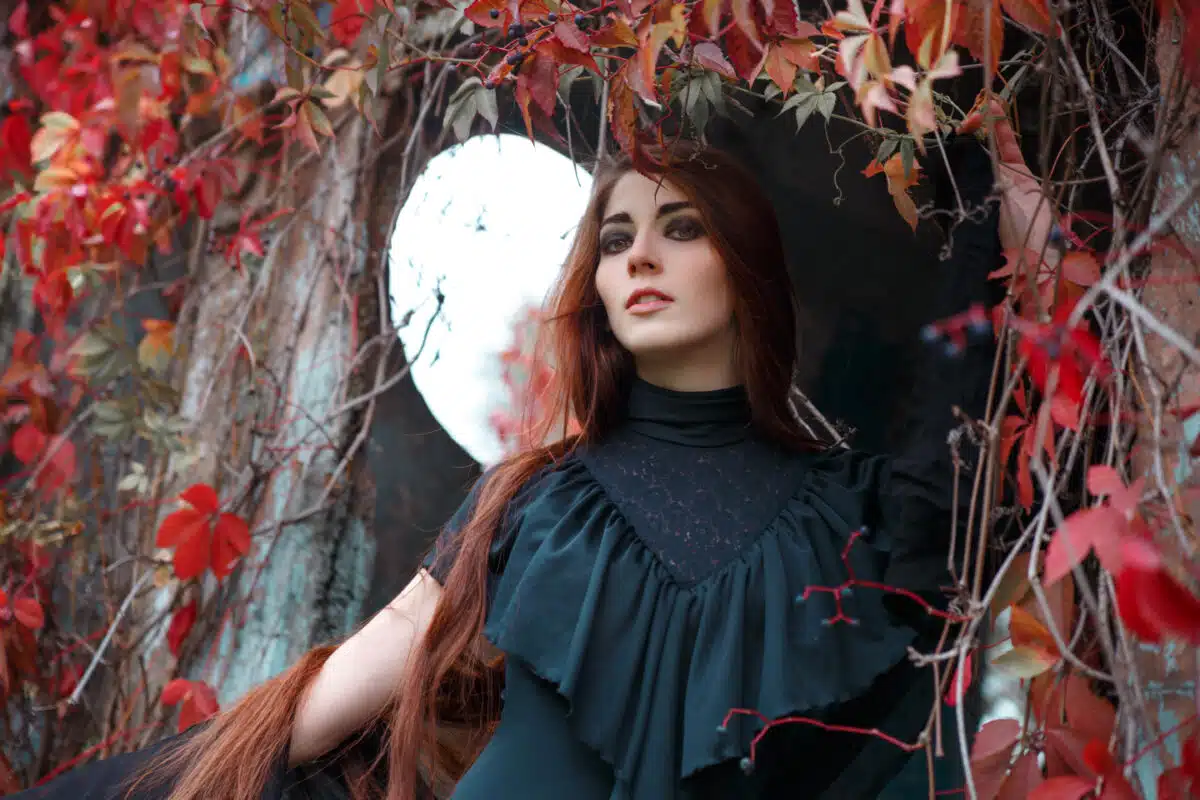
“The Disappointment” by Jane Taylor
In tears to her mother poor Harriet came,
Let us listen to hear what she says:
“O see, dear mamma, it is pouring with rain,
We cannot go out in the chaise.
“All the week I have long’d for this holiday so,
And fancied the minutes were hours;
And now that I’m dress’d and all ready to go,
Do look at those terrible showers! “
“I’m sorry, my dear, ” her kind mother replied,
The rain disappoints us to-day;
But sorrow still more that you fret for a ride,
In such an extravagant way.
“These slight disappointments are sent to prepare
For what may hereafter befall;
For seasons of real disappointment and care,
Which commonly happen to all.
“For just like to-day with its holiday lost,
Is life and its comforts at best:
Our pleasures are blighted, our purposes cross’d,
To teach us it is not our rest.
“And when those distresses and crosses appear,
With which you may shortly be tried,
You’ll wonder that ever you wasted a tear
On merely the loss of a ride.
“But though the world’s pleasures are fleeting and vain,
Religion is lasting and true;
Real pleasure and peace in her paths you may gain,
Nor will disappointment ensue. “
“Despondency” by Madison Julius Cawein
Not all the bravery that day puts on
Of gold and azure, ardent or austere,
Shall ease my soul of sorrow; grown more dear
Than all the joy that heavenly hope may don.
Far up the skies the rumor of the dawn
May run, and eve like some wild torch appear;
These shall not change the darkness, gathered here,
Of thought, that rusts like an old sword undrawn.
Oh, for a place deep-sunken from the sun!
A wildwood cave of primitive rocks and moss!
Where Sleep and Silence, breast to married breast
Lie with their child, night-eyed Oblivion;
Where, freed from all the trouble of my cross,
I might forget, I might forget, and rest!
“Despondency An Ode” by Robert Burns
I.
Oppress’d with grief, oppress’d with care,
A burden more than I can bear,
I set me down and sigh:
O life! thou art a galling load,
Along a rough, a weary road,
To wretches such as I!
Dim-backward as I cast my view,
What sick’ning scenes appear!
What sorrows yet may pierce me thro’
Too justly I may fear!
Still caring, despairing,
Must be my bitter doom;
My woes here shall close ne’er
But with the closing tomb!
II.
Happy, ye sons of busy life,
Who, equal to the bustling strife,
No other view regard!
Ev’n when the wished end’s deny’d,
Yet while the busy means are ply’d,
They bring their own reward:
Whilst I, a hope-abandon’d wight,
Unfitted with an aim,
Meet ev’ry sad returning night
And joyless morn the same;
You, bustling, and justling,
Forget each grief and pain;
I, listless, yet restless,
Find every prospect vain.
III.
How blest the solitary’s lot,
Who, all-forgetting, all forgot,
Within his humble cell,
The cavern wild with tangling roots,
Sits o’er his newly-gather’d fruits,
Beside his crystal well!
Or, haply, to his ev’ning thought,
By unfrequented stream,
The ways of men are distant brought,
A faint collected dream;
While praising, and raising
His thoughts to heav’n on high,
As wand’ring, meand’ring,
He views the solemn sky.
IV.
Than I, no lonely hermit plac’d
Where never human footstep trac’d,
Less fit to play the part;
The lucky moment to improve,
And just to stop, and just to move,
With self-respecting art:
But, ah! those pleasures, loves, and joys,
Which I too keenly taste,
The solitary can despise,
Can want, and yet be blest!
He needs not, he heeds not,
Or human love or hate,
Whilst I here, must cry here
At perfidy ingrate!
V.
Oh! enviable, early days,
When dancing thoughtless pleasure’s maze,
To care, to guilt unknown!
How ill exchang’d for riper times,
To feel the follies, or the crimes,
Of others, or my own!
Ye tiny elves that guiltless sport,
Like linnets in the bush,
Ye little know the ills ye court,
When manhood is your wish!
The losses, the crosses,
That active man engage!
The fears all, the tears all,
Of dim declining age!

“Disappointment” by Richard Lynott O’Malley
I awoke at the dawn of a school holiday,
And the heavens with clouds were o’ercast;
And I prayed for the sunlight’s tiniest ray,
But the rain fell heavy and fast,
Then I calmed my heart with the hope that soon
It would clear; and the sun at last
I saw, and I hoped, but alas! at noon
The rain fell heavy and fast.
Now faster and faster poured the rain,
Still I hoped through the storm and the blast;
And the night came frowning; my hopes were vain,
For the rain fell heavy and fast.
Ah! my holiday fled on her own rainy wind,
And my hopes followed close on her flight;
But the cold disappointment still clouded my mind
Which had chilled me from morning till night.
Then I thought “It is thus with full many a life;
Each hope comes and goes like a breath;
And the mortal toils on with vain hope through the strife,
From childhood to manhood and death.”
“Failure” by Madison Julius Cawein
There are some souls
Whose lot it is to set their hearts on goals
That adverse Fate controls.
While others win
With little labor through life’s dust and din,
And lord-like enter in
Immortal gates;
And, of Success the high-born intimates,
Inherit Fame’s estates. . .
Why is’t the lot
Of merit oft to struggle and yet not
Attain? to toil for what?
Simply to know
The disappointment, the despair and woe
Of effort here below?
Ambitious still to reach
Those lofty peaks, which men aspiring preach,
For which their souls beseech:
Those heights that swell
Remote, removed, and unattainable,
Pinnacle on pinnacle:
Still yearning to attain
Their far repose, above life’s stress and strain,
But all in vain, in vain!. . .
Why hath God put
Great longings in some souls and straightway shut
All doors of their clay hut?
The clay accurst
That holds achievement back; from which, immersed,
The spirit may not burst.
Were it, at least,
Not better to have sat at Circe’s feast,
If afterwards a beast?
Than aye to bleed,
To strain and strive, to toil in thought and deed,
And nevermore succeed?
“Failure” by Jean Ingelow
We are much bound to them that do succeed;
But, in a more pathetic sense, are bound
To such as fail. They all our loss expound;
They comfort us for work that will not speed,
And life – itself a failure.
Ay, his deed,
Sweetest in story, who the dusk profound
Of Hades flooded with entrancing sound,
Music’s own tears, was failure. Doth it read
Therefore the worse? Ah, no! so much, to dare,
He fronts the regnant Darkness on its throne. –
So much to do; impetuous even there,
He pours out love’s disconsolate sweet moan –
He wins; but few for that his deed recall:
Its power is in the look which costs him all.
